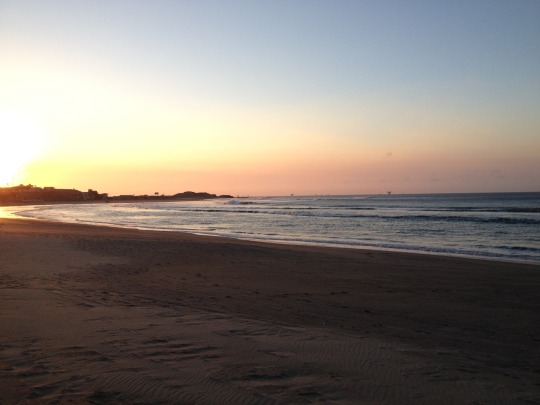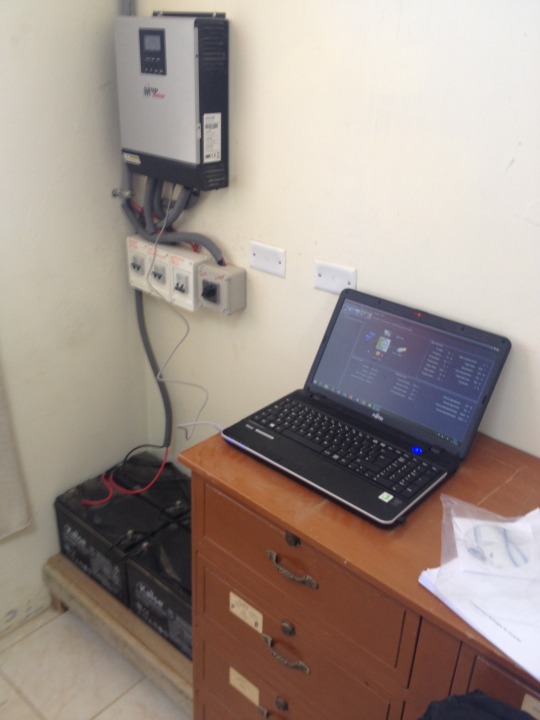Text
The EcoSwell Experience
Hi, my name is Lukas, I am from Austria and I volunteered at EcoSwell for 4 weeks in Summer 2017. After I graduated from Business School in Vienna, I was looking for a volunteer possibility in South America, especially in Peru. Through a surf movie night in Vienna, I discovered EcoSwell, and just days later I applied as a volunteer, as I was so impressed of all the things they were doing.
Half a year later I was in Lobitos, a lovely small fishermen village in the north of Peru. Overall said it was a crazy and amazing time. EcoSwell has a huge impact on Lobitos, which is lying in the middle of the Peruvian desert, where water is a rare and costly good. However, due to the beautiful beaches, the amazing waves and the relaxed atmosphere, also some tourists, especially surfers, find their ways to Lobitos.
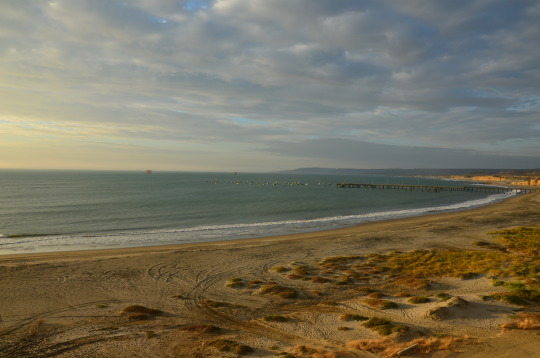
Besides helping the local fishermen, EcoSwell has committed itself to vegetate Lobitos and its neighbourhood districts, which is quite a challenge when water is that scarce.Through EcoSwell I learned a lot about recycling, composting, the unique ecosystem here in the north of Peru and on how to save water and plant trees in a desert. It was very instructive to see how the people are living here and what kind of problems they face (the sort of we could never imagine in Europe).
Due to my business background, I came here as a general helper. A project, in which I was involved and which I really liked, was called ‘Lobitos Verde’. This project is all about vegetating Lobitos in order to preserve its unique ecosystem. The following three photos show the typical three step process of this project. From speaking with the inhabitants of Lobitos, to collecting trees and finally planting them in the town joitnly with the locals.
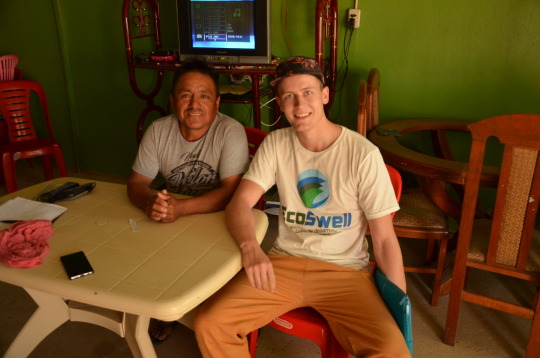
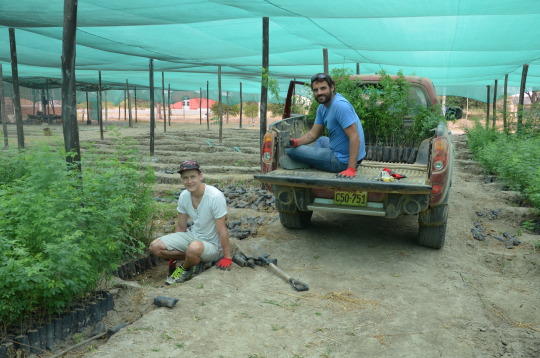
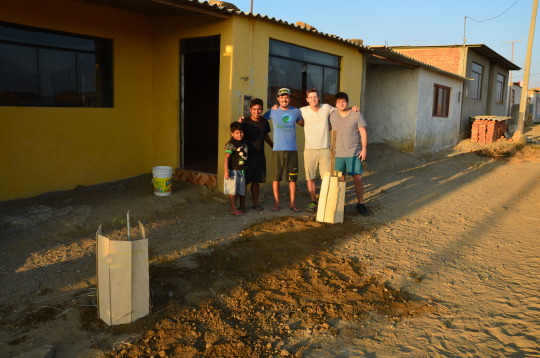
It was also amazing to experience how the founders of EcoSwell are so passionate about their NGO and the projects they conduct. This is a main reason why this Organization is growing so fast and gain more and more partners in Peru and worldwide. The hard work is paying off indeed.
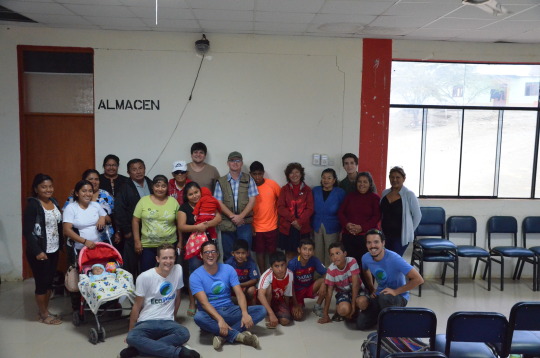
Thanks EcoSwell for this truly awesome month. It was great to be a part of this organization and I wish you all the best for the future.
0 notes
Text
Mi Experiencia como Voluntario Médico con EcoSwell
Mi nombre es Joshua Hinton y acabo de graduarme con un título médico de la Universidad de Bristol. Como parte de nuestra carrera, se nos da un período de dos meses para realizar un internado clínico, ya sea en casa o en el extranjero. Siempre fue mi ambición aprovechar esta oportunidad para viajar a Sudamérica para experimentar la medicina en un país de habla hispana y así comencé mi viaje electivo en busca de ubicaciones que coinciden con mis deseos.
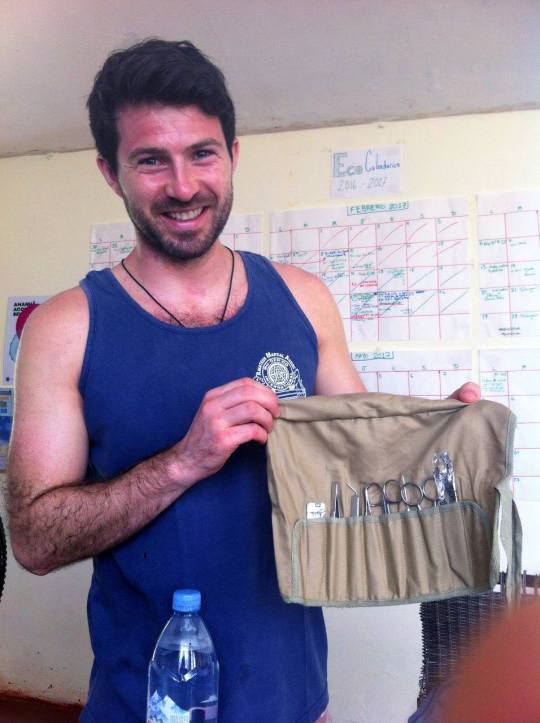
En un viaje de surf a Devon a principios de 2017, mi amigo, cofundador y director de operaciones de EcoSwell en el Reino Unido, Michael Alderson, mencionó que EcoSwell estaba iniciando un programa de voluntariado que llevó a los médicos a Lobitos. He sido consciente del increíble trabajo de EcoSwell, así como la belleza cruda de Lobitos y desde años siempre he tenido la intención de visitar, pero nunca bajo una capacidad médica. Parecía una oportunidad única. Después de una serie de conversaciones con Michael y el resto del equipo, establecimos algunos objetivos a corto y largo plazo y una semana más tarde, reservé mi boleto a Lobitos.
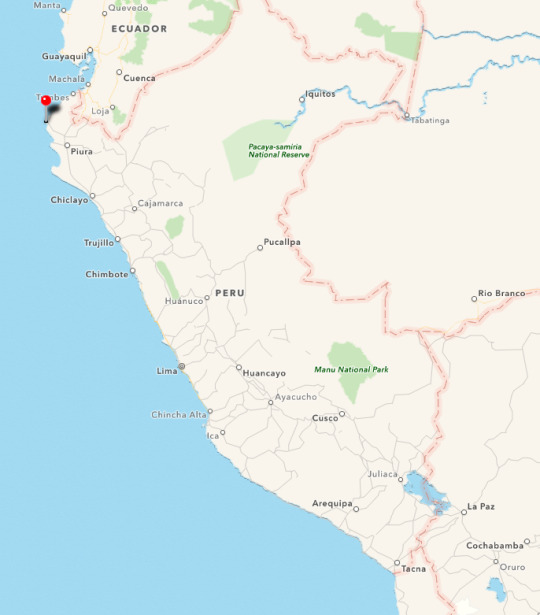
Lobitos se encuentra en la costa Noroeste del Perú y su historia se remonta a finales del siglo XIX cuando las ricas compañías petroleras llegaron para aprovecharse de los ricos recursos naturales de la zona. Estas empresas se vieron obligadas a abandonar el área en 1968, después de que el Perú pasó por un período de nacionalismo. Desafortunadamente, la economía local se derrumbó como consecuencia y durante años, el pueblo luchó por mantener los estándares a los que se había acostumbrado. Mientras la infraestructura de la ciudad comenzó a decaer, degradaba también el acceso a los derechos humanos básicos como la salud y el buen saneamiento. Hoy en día, Lobitos está experimentando rejuvenecimiento. La ciudad tiene una industria de turismo floreciente y una abundancia de peces. Hay un puesto de salud y un puñado de Organizaciones No Gubernamentales (ONGs), entre ellas - EcoSwell.
Como parte del programa electivo médico de EcoSwell, tenía como objetivo viajar a Lobitos para evaluar las necesidades de salud de la ciudad con el fin de proporcionar una plataforma para que los futuros profesionales de la salud sigan construyéndola. También esperaba trabajar en estrecha colaboración con el puesto de salud para tratar condiciones comunes. Sin embargo, en los días previos a mi salida todo cambió. El noroeste del Perú fue golpeado por 'el Niño', un frente meteorológico que trae consigo una devastadora lluvia a la costa peruana y con ella, graves inundaciones. Las dos quebradas vacías que se sientan a ambos lados de Lobitos se habían inundado, dejando al pueblo desconectado del continente. Lobitos usualmente consigue su agua por un camión cisterna. Sin embargo, ninguno de los camiones de agua podía pasar las inundaciones para alcanzar Lobitos y así el pueblo tenía que confiar en el agua de lluvia como fuente de agua para beber, limpiar y cocinar.
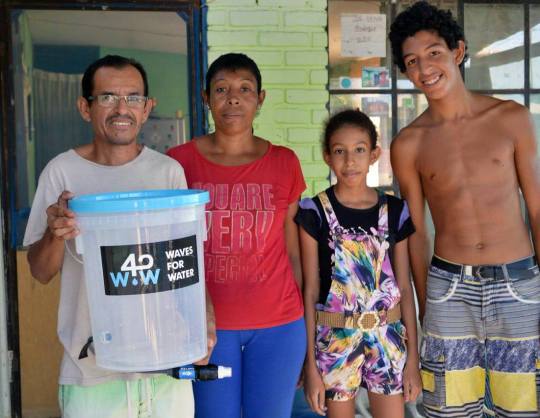
Cuando llegué, EcoSwell llevó a cabo visitas de casa en casa a los más vulnerables para analizar qué apoyo era muy necesario. Era obvio que el acceso al agua limpia tenía que ser la prioridad. El equipo obtuvo filtros de agua de Lima y los distribuyó por toda la ciudad. También establecieron un centro de refugio en el Salón Comunal del Gremio de Pescadores, un edificio que EcoSwell previamente había equipado con energía solar. Aquí, la gente podría venir y filtrar el agua de lluvia y discutir cualquier problema de salud.
Mientras la lluvia disminuyó y la temperatura aumentó, también hubo una amenaza inminente de varias enfermedades transmitidas por el agua. EcoSwell organizó donaciones de medicamentos y repelentes de insectos y los hemos distribuido junto con información para prevenir un brote de dengue, chikungunya, malaria, cólera e infecciones gastrointestinales adicionales. Desafortunadamente, hubo una serie de casos de diarrea acompañada de calambres estomacales, así como sospecha de dengue. Sin embargo, estoy seguro de que el suministro de agua limpia ayudó a evitar que alguien tenga que ser trasladado al hospital local, que está a 20 minutos en tiempo seco.
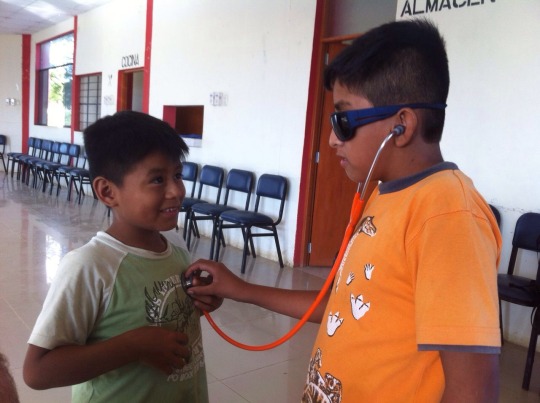
Además de tratar a los individuos afectados por el Niño, hubo una serie de casos más comunes. Me enfrenté con sarna, infecciones en el pecho, agrandamiento de la próstata y dolor de espalda. Hubo una serie de presentaciones más difíciles, empeoradas por la falta de acceso a los análisis de sangre básicos o cualquier imagen. Por ejemplo, una mujer se presentó con un abdomen severamente sensible que se había empeorado progresivamente durante un período de 24 horas. La partera local y yo tuvimos que decidir cuándo necesitaba ser traslada al hospital, que es un viaje costoso y burocrático para organizar. Estuvimos de acuerdo en que era probablemente una causa ginecológica y la mejor opción que podíamos ofrecer era analgésicos y un ultrasonido a primera hora de la mañana siguiente. Afortunadamente, la ecografía confirmó un quiste ovárico, lo que significó que podría tener un tratamiento no invasivo.
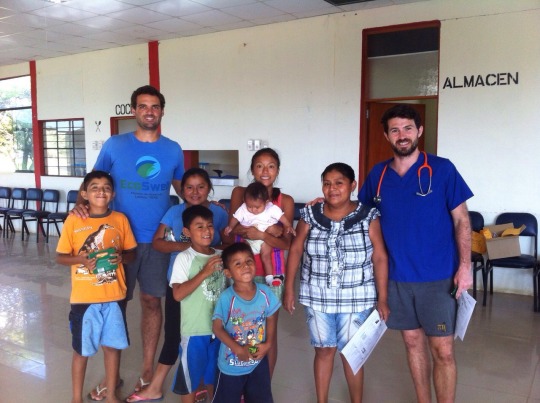
Además de ser extremadamente emocionante, este internado electivo fue enormemente enriquecedor. Fue divertido, estimulante, desafiante y gratificante. Exige un enfoque práctico, pero EcoSwell y el puesto de salud proporcionan un ambiente de apoyo en el que los estudiantes pueden trabajar, aprender y prosperar. Todo el mundo es muy amable ya que el pueblo está muy agradecido por cualquier ayuda externa, especialmente considerando que el Ministerio de Salud sólo pone un médico en Lobitos durante 6 meses del año. Durante los otros 6 meses, la ciudad se depende de una partera y una enfermera maravillosas. Por lo tanto, los voluntarios médicos pueden ofrecer asistencia médica esencial durante la mitad del año. No puedo hablar lo suficiente de este internado electivo. He aprendido mucho y he conocido a tantos amigos. Es una experiencia verdaderamente extraordinaria.
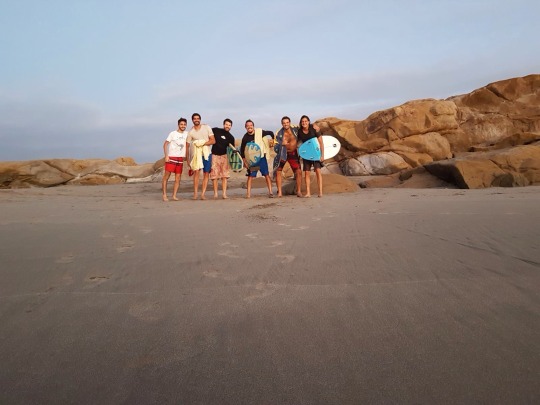
0 notes
Text
My Medical Elective Experience with EcoSwell
My name is Joshua Hinton and I have just graduated with a medical degree from the University of Bristol. As part of our degree, we are given a two month period to undertake a clinical placement either at home or abroad. It was always my ambition to use this opportunity to travel to South America to experience medicine in a Spanish speaking country and so I started my elective journey searching for placements matching that description.
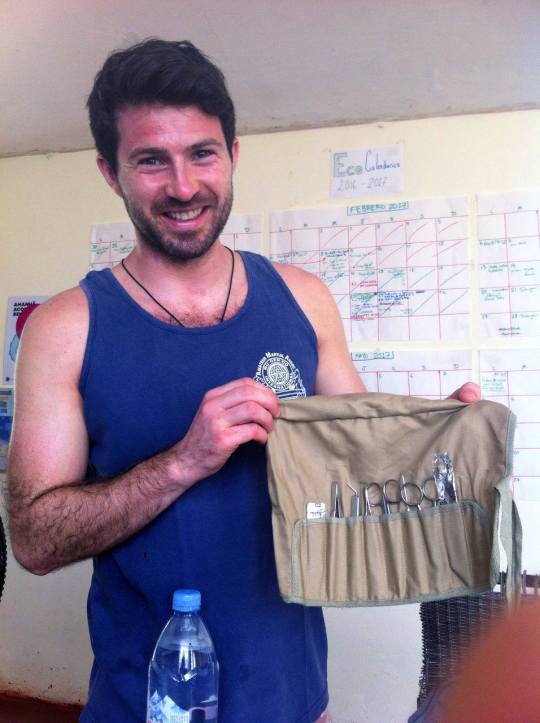
As chance would have, on a surfing trip to Devon at the start of 2017, my friend, co-founder and head of EcoSwell operations in the UK, Michael Alderson, mentioned that EcoSwell were starting a volunteer programme that brought doctors to Lobitos. I have been aware of EcoSwell’s amazing work, as well as the raw beauty of Lobitos and for a number of years and I had always intended to visit but never under a medical capacity. It seemed like a unique opportunity. After a series of conversations with Michael and the rest of the team, we established some short and long term goals and a week later, I booked my flights to Lobitos.

Lobitos sits on the North West coast of Peru and its history dates back to the end of the 19th Century when rich oil companies arrived to take advantage of the area’s rich natural resources. These companies were forced to leave the area in 1968, after Peru underwent a period of nationalism. Unfortunately, the local economy subsequently collapsed and for years the town struggled to meet the standards to which it had become accustomed. As the town’s infrastructure started to decay, so did access to basic human rights such as health and good sanitation. Nowadays, Lobitos is experiencing rejuvenation. The town has a burgeoning tourism industry and plenty of fish. There is a health post and a handful of Non-Governmental Organisations (NGOs), including EcoSwell.
As part of EcoSwell’s Medical Elective Programme, I was aiming to travel to Lobitos to assess the health needs of the town in order to provide a platform for future health professionals to build on. I was also hoping to work closely with the Health Post to treat common conditions. However, in the days running up to my departure the goal posts shifted. The North-West of Peru was hit by ‘el Niño’, a weather front that brings a devastating amount of rain to Peru’s coast and with it, severe flooding. The two empty river beds that sit either side of Lobitos had flooded, leaving the town cut off from the mainland. Lobitos usually relies on water to be delivered by a lorry tanker. However, none of the water trucks could pass the floods to reach Lobitos and so the town had to rely on rain-water as their source of water for drinking, cleaning and cooking.

As I arrived, EcoSwell carried out house-to-house visits in the most vulnerable to analyse what support was badly needed. It was obvious that access to clean water had to be the priority. The team sourced water filters from Lima and distributed them throughout the town. They also established a refuge centre at the Fisherman’s Guild, a building that EcoSwell previously fitted with solar power. Here, people could come and filter rain water and discuss any health issues.
As the rain subsided and the temperature increased, there was also a looming threat of various waterborne diseases. EcoSwell has organised donations of medication and insect repellent and we distributed these, along with information to prevent an outbreak dengue, chikungunya, malaria, cholera and further gastrointestinal infections. Unfortunately, there were a number of cases of diarrhoea accompanied with stomach cramps, as well as suspected Dengue. However, I’m sure that the supply of clean water helped to prevent anyone from having to be transferred to the local hospital which is a 20 minutes’ drive away in dry weather.
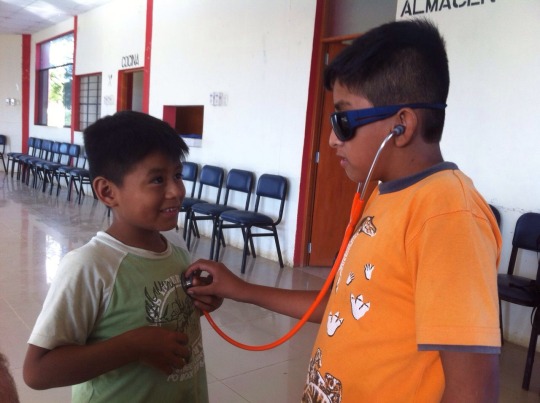
As well as treating individuals affected by el Niño, there were a number of more common cases. I was faced with scabies, chest infections, prostate enlargement and lower back pain. There were a number of more difficult presentations, made worse by the lack of access to basic blood tests or any imaging. For example, a lady presented with a severely tender abdomen that had been getting progressively worse over a 24 hour period. The local midwife and I had to decide when she needed transfer to the hospital, which is an expensive and bureaucratic trip to organise. We agreed that it was probably a gynaecological cause and the best option that we could offer was analgesics and an ultrasound first thing the next morning. Fortunately, the ultrasound confirmed an ovarian cyst which meant that she could have non-invasive treatment.
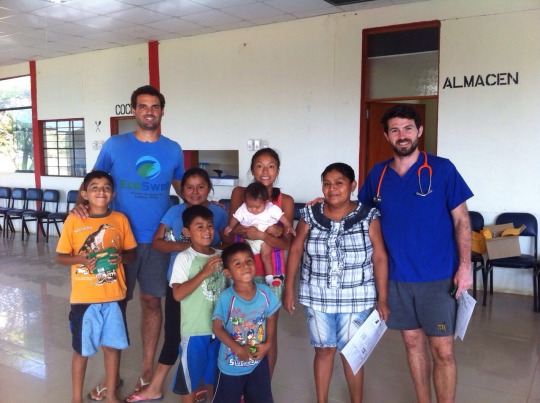
As well as been extremely exciting, this elective placement was hugely enriching. It was fun, stimulating, challenging and rewarding. It demands a hands-on approach, but EcoSwell and the health post provide a supportive environment in which students can work, learn and thrive. Everyone is very friendly as the town is extremely grateful for any outside help, especially as the Ministry of Health only places a doctor in Lobitos for 6 months of the year. During the other 6 months, the town relies on a wonderful midwife and a nurse. Therefore, elective students can offer essential medical assistance for half of the year. I can’t speak highly enough of this elective placement. I’ve learnt so much and I’ve made so many friends. It is a truly extraordinary experience.
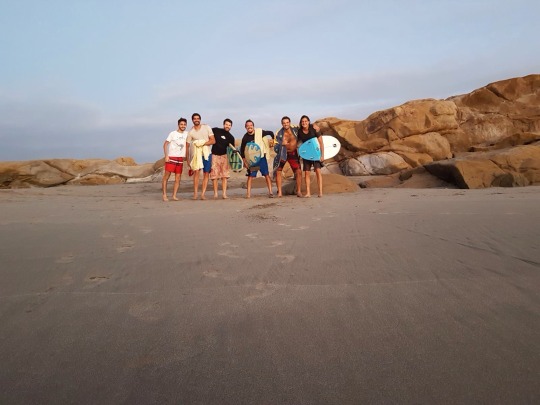
0 notes
Text
4,400 universitarios británicos diseñan proyectos de ingeniería sostenibles para Lobitos, Perú
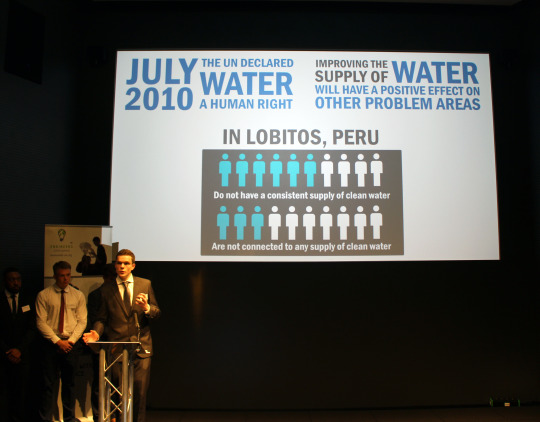
El pasado 19 de junio en Londres, Ingenieros Sin Fronteras – Reino Unido (EWB-UK) sostuvo la premiación del “Engineering For People Design Challenge” (Reto de Diseño de Ingeniería al Servicio de las Personas), un concurso en el que participaron más de 30 de las mejores universidades del Reino Unido. Los participantes tenían como objetivo apoyar la labor de la ONGD peruana EcoSwell en la caleta pesquera de Lobitos, Talara, diseñando proyectos de ingeniería sostenible para resolver la carencia de servicios básicos en la localidad. Un total de 4,400 estudiantes Británicos participaron en este iniciativa, es decir, más del doble de la población lobiteña, en el diseño de proyectos que buscan mejorar la calidad de vida de esta población.
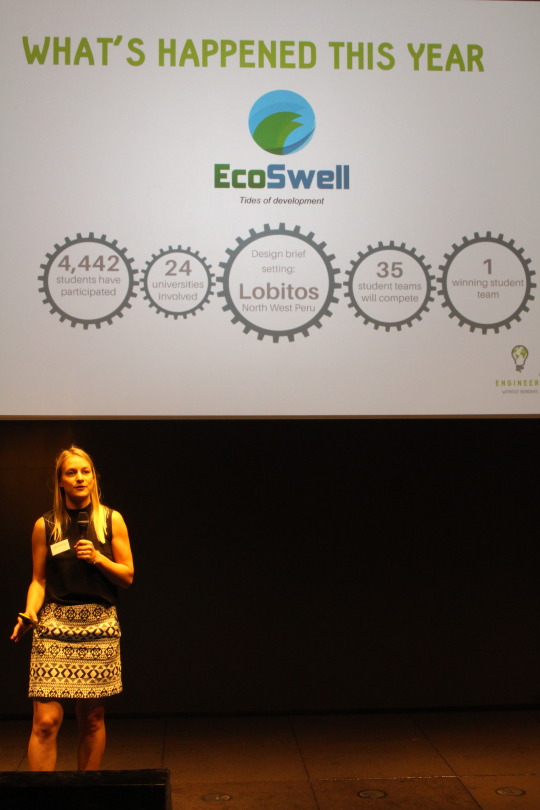
Katie de EWB presenta a EcoSwell como la organización seleccionada para el evento 2017
Se diseñaron proyectos extraordinarios, de pesca, tratamiento de agua, energía renovable, saneamiento, comunicaciones, entre otros, en el transcurso de 18 meses. Durante este periodo el equipo de EcoSwell y de EWB-UK estuvieron en constante comunicación con los estudiantes, brindando la información requerida para sus diseños. Las ganadoras fueron 4 estudiantes de ingeniería civil de la Universidad de Strathclyde (Escocia), que se propusieron solucionar los problemas de la Posta Médica de Lobitos instalando una turbina eólica y un filtro de arena. La energía limpia generada por la turbina bombea el agua, para que esta pueda luego limpiarse a través del filtro. Este diseño evitaría la pérdida de vacunas debido a cortes de luz y aseguraría un suministro de agua limpia para la atención de los pacientes, que son en su mayoría madres y niños. Ahora que los proyectos han sido diseñados, EcoSwell estará analizando maneras de implementarlos y de financiarlos.
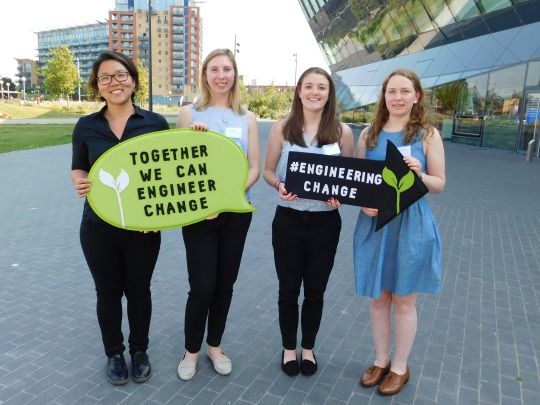
Las ganadoras del concurso, de la Universidad de Strathclyde, Escocia.
El concurso, se sostiene anualmente, convocando a académicos, y estudiantes de 30 universidades que desarrollan los proyectos durante un ciclo de clases y luego los presentan para ser evaluados por un panel de expertos del sector privado, público, civil y académico. Cada año, EWB-UK escoge a una de sus organizaciones aliadas de alrededor del mundo y una localidad beneficiaria, a la que estarán dirigidos los proyectos. Este año la organización elegida fue EcoSwell y sus operaciones en Lobitos. Tres miembros peruanos de EcoSwell participaron como jueces en el evento en Londres.
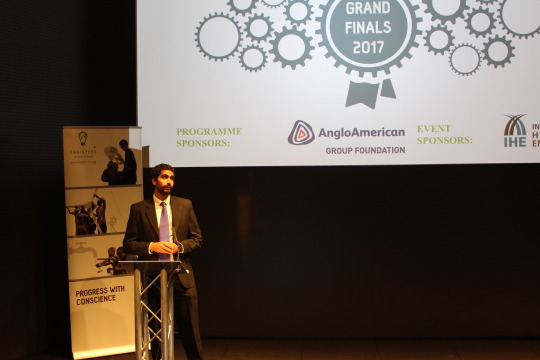

Michael Alderson y Alejandro Pizarro, fundadores de EcoSwell, durante las presentaciones
EcoSwell es una red internacional de profesionales que despliega conocimiento global para empoderar a comunidades locales, buscando que las personas y la naturaleza prosperen en armonía. Fue fundada en Perú en el año 2013 por un grupo de jóvenes amigos de infancia, y viene operando en Lobitos, Talara, paraíso de pesca y surf en el norte peruano, trabajando junto con las comunidades pesquera y turística del distrito. Sus proyectos buscan soluciones sostenibles a la carencia de servicios básicos (energía renovable, tratamiento de agua y saneamiento), y también enverdecimiento comunitario y recuperación del ecosistema del bosque seco ecuatorial, y sus especies en peligro de extinción.
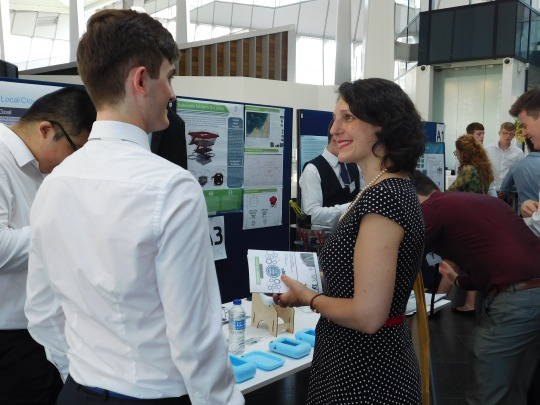
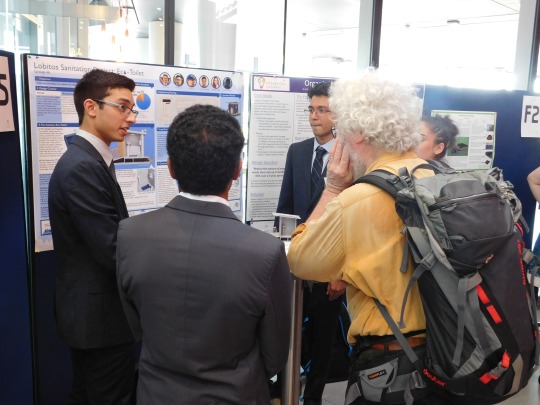
Presentaciones de estudiantes a los jueces del evento
Puedes seguir el progreso de EcoSwelll en Facebook visitando: www.facebook.com/ecoswell y visitando su página web: www.ecoswell.org.
Si deseas aplicar al Programa de Voluntariado de EcoSwell para diseñar y aplicar proyectos de desarrollo sostenible en Lobitos, escribe un correo a [email protected].
0 notes
Text
Mi experiencia con EcoSwell en Lobitos
Hola, mi nombre es Diego Zelada, nací en Cusco y soy un estudiante de ingeniería industrial de la Universidad de Lima y en este blog quiero contar acerca del trabajo que hice y de las experiencias que vivi durante los 2 meses que estuve en Lobitos junto a EcoSwell. Trataré de mostrar algunas fotos que recuperé ya que perdí mi celular en un pequeño viaje en el mar.
Yo fui a realizar a desarrollar principalmente el proyecto de “Baños Secos” y viaje junto a un amigo, Añejo Espezua, que fue a hacer una campaña de salud oral. Viajamos hacia Talara, una ciudad portuaria que tiene una de las refinerías más grandes del Perú así que ver las maquinas gigantes que transportaban me pareció algo alucinante. Al día siguiente nos recogieron Diego Almendradres y Andres Bustamente, líderes de EcoSwell - nos llevaron por el camino de Quebrada Honda y nos fueron explicando la historia y la situación actual de Lobitos, de cómo las instituciones municipales se habían “preparado” para el niño del 2016, lo cual después de un tiempo la naturaleza demostró que no servía para nada.
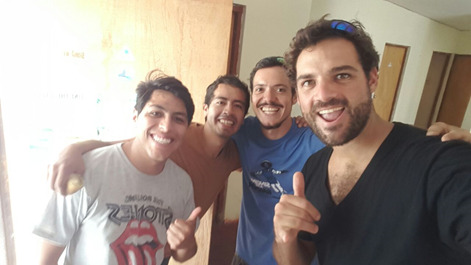
Llegamos a Lobitos, un pueblo lindo, de esos donde la gente siempre se saluda, pequeño y acogedor, con playas hermosas buenazas para surfear y atardeceres preciosos, se encuentra rodeado de compañías petroleras y muchos bombeadores de petróleo incluso dentro del pueblo. Los primeros días me encargue de preparar todo para la construcción del baño y de ayudar a Añejo en sus campañas, así que gracias a eso pude ir al Gremio de Pescadores, un lugar que pertenece a la asociación de pescadores en la que EcoSwell construyó paneles solares y un biodigestor, además de ver a bastantes niños y vacilar con ellos mientras Añejo los atendía.
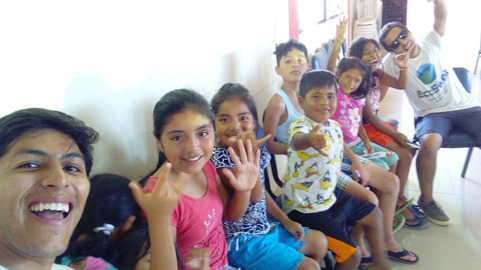
Días después volvió David Doyle, un voluntario encargado del proyecto de “Desalinización de Agua de Mar”, un tipo genial y mate de risa; después de unos días más llego Alejandro Pizarro, otro de los líderes de la organización y así se completó la comitiva. También durante esos días me dediqué a cotizar el proyecto, fue así que gracias a los contactos de EcoSwell pude encontrar a la gente adecuada para trabajar: Pedrito Rivera sería quien me ayude con todo el trabajo de albañilería y fontanería, y Nando con el trabajo de Carpintería así que con eso listo empecé a cavar el hueco del baño para iniciar con el proyecto.
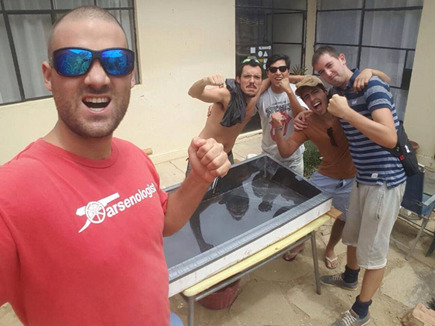
El ultimo día de Dave decidimos ir a caminar con instrumentos mientras anochecía, pudimos ver Lobitos de noche desde el reservorio de agua, luego caminamos por el desierto de noche y fuimos hacia un cementerio ingles que tiene tumbas de más de 100 años, despues fuimos hacia el hostel “El Cuartel” donde comimos buenazo y tomamos unas chelas alrededor de una fogata; al volver y antes de entrar a la casa decidimos bañarnos en el mar y como para cerrar la noche con broche de oro en ese momento ocurría un fenómeno rarísimo que hacía que el plancton brille de un color verde, se podía ver en el mar y en la arena, cuando pisabas fuerte era como si el plancton se conectara y todo el borde de tu pie brillaba, alucinante.
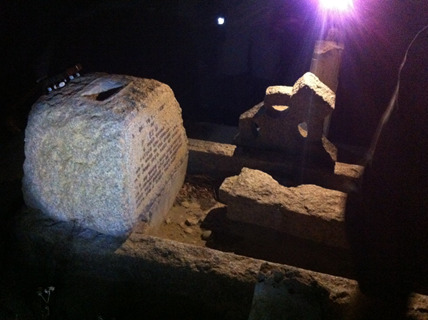
EcosWell tenía una invitación de la ONG WindAid para ir a ver sus proyectos en Playa Blanca-Piura, ellos hacen turbinas para hogares que se encuentran en comunidades fuera de la red de electricidad nacional, así que nos preparamos y fuimos. Añejo se tenía que ir así que aprovecho que salíamos y se fue. Llegamos a Playa Blanca de noche y conocimos a Jessica Rivas, una chica súper buena gente y muy pilas que es una de las cabezas en esa organización; era la última noche de los voluntarios de WindAid así que compartimos un rato con ellos y nos fuimos a descansar. Al día siguiente nos hicieron un tour por el pueblo y vimos como crecieron y desarrollaron sus proyectos, también vimos un baño seco que construían ahí para los próximos voluntarios. La gente de WindAid, después de unas palabras con los dirigentes, se fue hacia Trujillo, que es donde está su base principal; nosotros nos quedamos un rato y hablamos con los dirigentes para darles un alcance de lo que hacíamos.
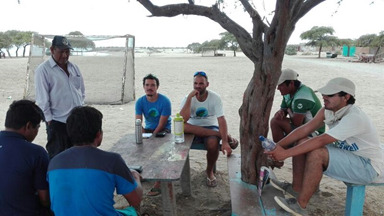
Como buenos surfers, los chicos de EcoSwell sabían de un lugar cerca donde se corrían buenas olas asi que decidimos ir en búsqueda de ese lugar; tuvimos que tomar la ruta larga debido a unas tranqueras que se encontraban cerradas en ese momento, fue así que cruzamos por la Reserva de Illescas hasta llegar a la costa, luego seguimos los caminos al lado de las playas y pudimos ver un montón de aves que están en la reserva, de todos los tamaños y colores; fue un buen viaje pero un poco intenso ya que nos quedamos atrapados en la arena 2 veces, una de las cuales nos tomó 2 horas salir, fuimos por un camino que no era e incluso entramos a un valle que daba toda la idea a una película postapocalipitca; pero todo valió la pena una vez que llegamos al lugar - era un km. de largo de playa con buenas olas donde había un hotel pajasa, realmente un paraíso escondido.

Después de un tiempo las lluvias empezaron a ser más fuertes poco a poco, todo Lobitos se empezó a tornar verde, los bosques secos empezaron a cobrar vida, también comenzó a haber cortes de electricidad y de agua; en ese tiempo recibimos la visita del Ingeniero Alois Kennerknecht, especialista en desarrollo integral rural y ecológica urbana, el cual nos explicó más acerca del Vetiver, una planta increíble con aplicaciones en saneamiento, contención de suelos, agricultura, cosméticos, etc. Fue así que empezamos con el proyecto del Vetiver, el cual sé que será de gran relevancia para solucionar el problema de aguas servidas en Lobitos.
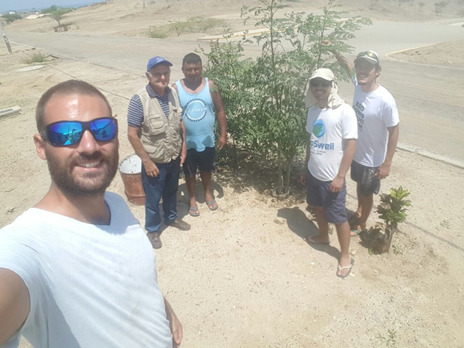
Durante ese tiempo llego Daniel Boyco, un tipo chévere y muy buena voz que nos ayudó con distintos proyectos; Alice Hammer, una voluntaria linda con una voz increíble que se encargó principalmente del proyecto de “Filtro de Bioarena” y juntos apoyamos en el proyecto de “algas marinas”. Esos días las lluvias se intensificaron y el camino de Quebrada Honda ya no era utilizable así que para llegar a Talara se tenía que tomar los caminos de las petroleras, los cuales son de tierra por lo que se formaba barro y hacia el camino resbaloso haciendo el viaje una mayor travesía e aislando momentáneamente a Lobitos; el agua se cortó de manera ininterrumpida así que tuvimos que racionar y aguantar con el agua que proveían las cisternas.
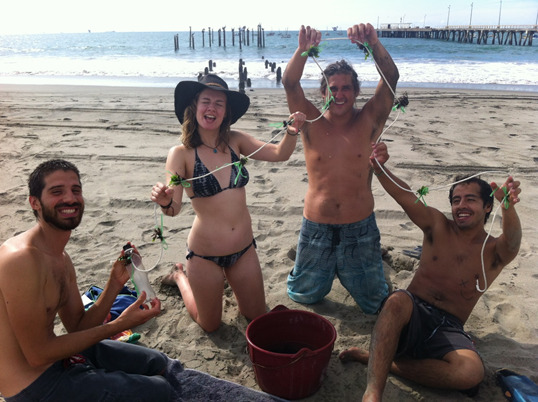
Conseguimos los fondos para iniciar el proyecto del “Baño Seco” así que me dediqué a comprar los materiales y construir junto con Pedrito Rivera y su padre, ambos super chamba, las partes más importantes del baño seco; compartí bastante con Pedrito y aprendí un montón de construcción de él. Es una persona con un gran corazón y muchas historias, incluso nos ayudó con agua cuando la cisterna no llegaba, un tipaso.
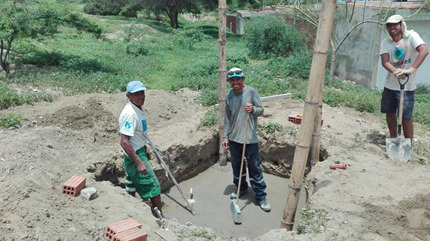
También mientras construíamos recibimos la visita de Jessica que vino a evaluar la posibilidad de hacer un proyecto conjunto con WindAid y aplicarlo en Lobitos, ojala se logre.
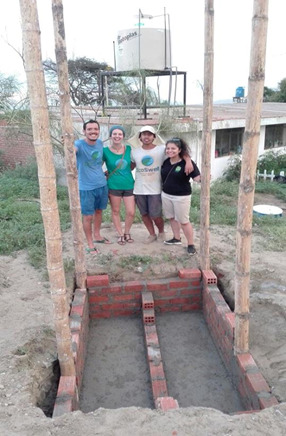
Tiempo antes de que me tenga que ir las lluvias se intensificaron, el barrio de Zarumilla, donde vive Pedrito, y el baño seco se inundaron así que la construcción tuvo que parar para solucionar los problemas, lamentablemente esto desemboco en que falte tiempo para terminar completamente el baño, esto es lo único que me apeno del viaje.
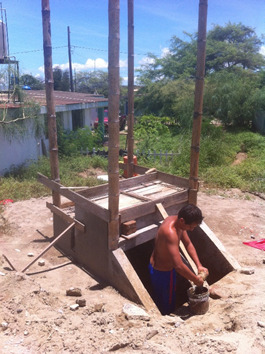
El último día me tocó realizar el workshop acerca de la construcción del baño seco. A pesar de que todo Lobitos estaba lleno de barro y sufriendo los peores momentos en los que estuve, fueron unas cuantas personas a las cuales se les conto todo sobre el proyecto, la gran investigación que hubo, la manera cómo funciona el baño, cuáles fueron los pasos de su construcción, el tiempo que tomó, los materiales, las consideraciones especiales de acuerdo y la ubicación y el plan de largo plazo que tiene EcoSwell para esparcir este proyecto en lugares planificados en Lobitos.

Ya era tiempo de partir y la única manera de salir fue en un bote. Fue así que me despedí de Lobitos, surcando sus olas bajo una ligera lluvia.

Disfrute un montón de Lobitos, sus playas, sus juergas, la vidita, es un lugar paradisiaco; es por eso que me molesta mucho que tenga las autoridades que tiene, mal preparadas, ineficientes, corruptas, populistas, sometidas a los intereses privados; algo que en experiencia personal sé que ocurre en todo el Perú, las organizaciones municipales son las que más daño le hacen a la gente. Es por eso que haber conocido a EcoSwell me hace muy feliz, son personas que ya se encuentran marcando la diferencia, profesionales que lo dejaron todo para dedicarse a ayudar (realmente hay que ser loco para tomar esa decisión), cada uno especializado en diferentes áreas, con personalidades y enfoques distintos trabajando en conjunto con los voluntarios para sacar adelante las grandes ideas que tienen para la gente y todo esto sin querer llamar la atención.
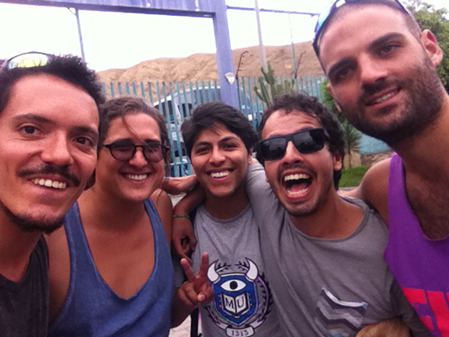
El general Tibus dijo alguna vez: “Una vez que llegas a Lobitos, Lobitos siempre se quedara en ti”; yo creo que siempre disfrutas de un lugar y lo que marca una diferencia en el alma es la gente con la que compartes y para mi compartir juegos, experiencias, pasiones, chelitas en “La Casona” y tantas cosas con mis hermanos, broders, wayquis de EcoSwell significo la marca de Lobitos que llevo ahora en el corazón.
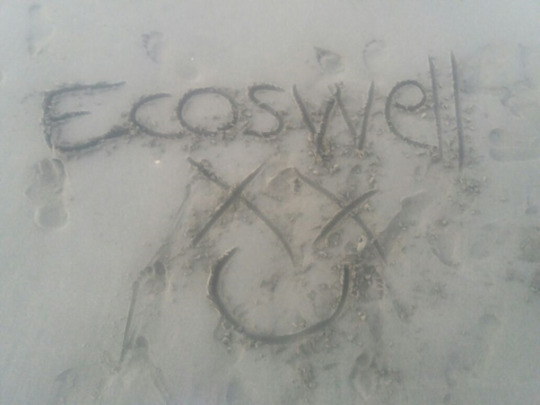
0 notes
Text
My rewarding experience with EcoSwell
The name is Miguel Bustamante and I am a recent graduate from the Peter Gustavson Business School of the University of Victoria from Canada. As a recent graduate I wanted to travel back to the motherland being a Peruvian. I’m the son of two Peruvian parents so I travel to Peru pretty often, but I wanted to make this trip different. I chose to volunteer for EcoSwell to help those less fortunate than me as a way to give back to the Peruvian people who have provided me with years of incredible memories in this country that I am so thankful to share.
As I do not come from any science or engineering background I chose to volunteer as a general helper to aid in any research or task EcoSwell had going on. Since I come from a business background and can speak Spanish fluently I assumed the role of interacting with the locals and helping out in the progression of their projects through translation. Apart from interacting with the locals and acting as a broker between English speaking volunteers and the locals I helped EcoSwell in administrative means by translating the collected statistics and research into a formal document that can be distributed. Moreover, I helped finish and improve existing projects, which for example included building a fence at a school in Piedritas (a city located on the way to Lobitos) to protect existing plants that had already been planted that promote the life of an endangered birds species called the Peruvian Plantcutter.
Apart from the amazing work EcoSwell is involved in, Lobitos is heaven on earth for a beach lover. You basically live on the shore of a beautiful beach that has people from all over the world visit to surf. The house you live in is very comfortable and welcoming which is what you will notice is very apparent about the Peruvian culture. Can’t forget that on your spare time, you have endless amounts of places to visit in Peru impossible to find anywhere else in the world and the guys at EcoSwell make sure you take full advantage of that. In conclusion, EcoSwell is an amazing place to volunteer at if you are eager in helping others while being fully immersed in the Peruvian culture, eating the best food in the world and living a stress free life while doing it.
0 notes
Text
First month in North Peru
My name is David Doyle, I am from Ireland and I have a degree in electrical engineering. All my life I have always wanted to do voluntary work and help people who are less fortunate then me, along with this I have also wanted to visit and explore South America. So, when I discovered Ecoswell I knew it was a golden opportunity to achieve both as well as gaining valuable work experience in my career field.
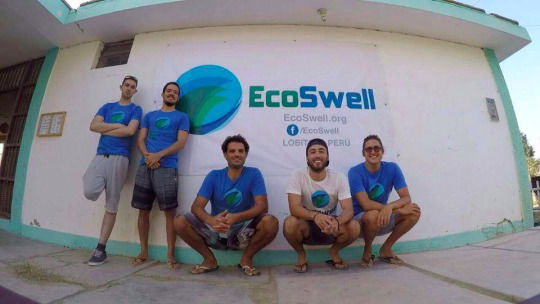
My main task here with EcoSwell is to construct a solar water distiller and test its operation. Here in Lobitos water can be scarce and even more so in the summer months, so having the opportunity to help with and alleviate this problem is very rewarding. So far, in my first week I have been working on drip irrigation systems which use recycled water. In my second week, I have been working with solar panels and its acquisition of energy usage, for the remained of my time we have being planting native plants in desert area, constructing fences at local schools and providing wave and swell charts for the local fisherman here to use. Along with ordering of materials and planning of construction of the solar water distiller. Every day I know the work I am doing will practically help the life’s of others and I learn something new every day.
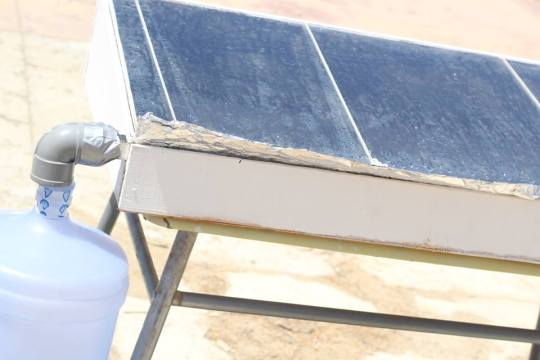
The guys here in the EcoSwell house are great to both live and work with and are very laidback and supportive. Since living here my Spanish has improved and learned how to prepare and cook some the nicest dishes I have ever tasted (The food here is Peru is amazing!), along with what is now my most favourite drink Pisco Sour! So far, I went surfing, hiking and cave exploring with the guys.
Life in here in Lobitos great, the beach is beautiful, the restaurants offer delicious food with the cheapest of prices, the weather is amazing I have discovered my new-found love for surfing. The people and the lifestyle here is very laidback and relaxed. I met a lot of cool people from all over the world on my stay here so far. I also have visited Mancora which I would recommend along other beaches and towns in north Peru.
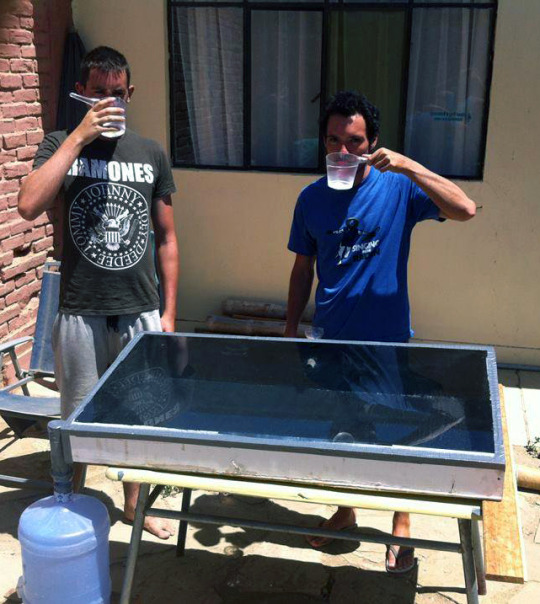
0 notes
Text
A summer to remember: Zach’s last month with EcoSwell
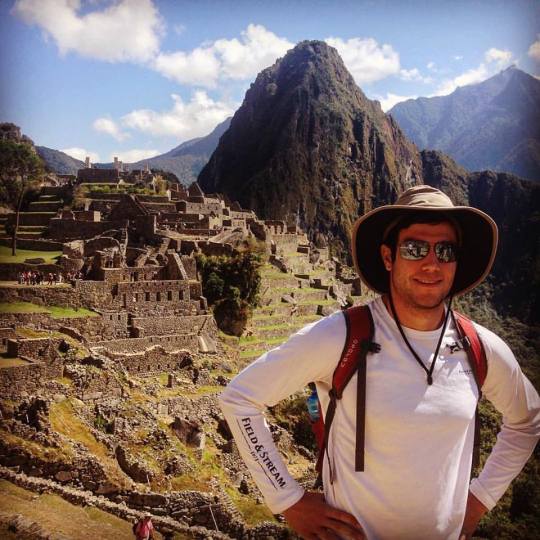
During his last days in Peru, Zach visited the Andes and experienced their magnificence.
The last time I wrote, the EcoSwell team and I had been preparing the drip irrigation system at our house, as well as a community presentation workshop and presentation focused on this form of sustainable irrigation. In the following weeks since that update, a vast amount of progress and discovery has occurred at EcoSwell and in my own life. We hosted the workshop and have started to work on an exciting new project based around the reforestation of Palo Negro Plants in the Lobitos area in an effort to create suitable habitat for the endangered Peruvian Plantcutter (Cortarrama Peruana) in a manner that promotes community building. Additionally, during my last 10 days in Peru, I had the opportunity to travel around the country and see some of the most magnificent products of both nature and man in Cusco, the Sacred Valley, Machu Picchu, and the Amazon Rainforest. This experience capped off what has ultimately been the experience of a lifetime, as I have faced many revelations about the struggles many individuals face around the globe, and what I want to do for a career and as a human being.
The majority of my last month working at EcoSwell was spent testing the newly constructed drip irrigation system, making modifications, and assembling a presentation and discussion questions that encompassed the functions, benefits, costs, and various types of drip irrigation. The session consisted of about 20 community members and project leaders of the Lobitos Verde project. After an informational presentation and demonstration of how the EcoSwell drip irrigation system works, the floor was opened for discussion. Right off the bat, the participants portrayed their excitement for the concepts of drip irrigation in their own gardens by providing us with ideas for potential improvements. The conversation quickly evolved into a brainstorm about how to implement drip irrigation using solely reused material. Participants were drawing diagrams on the whiteboard and everyone was actively collaborating about how to make such an efficient system an even more sustainable one. My expectations for this workshop were tampered by the nerves I had built up over the fact that I was going to give a full 30 minutes presentation in a language that I was still trying to master only to realize that the community members were the driving force behind the success of the workshop, as well as the project as a whole. By initiating the conversation and providing the participants with this information and new idea, I was simply planting seed that would be nurtured by their creativity and thoughtfulness. At the conclusion of the workshop each participant had left with a unique idea of how they were going to make Lobitos a more sustainable, more water efficient, and greener community.

¡Margoth takes the workshop away during the drip irrigation brainstorm!
My dad was able to make his way to Lobitos for my last few days on the job, and his time there turned into much more than a simple vacation. As a member of the Columbus Zoo Conservation Management Committee, he was able to provide the EcoSwell team with guidance as we developed a profile and drafted a proposal for the grant that this committee provides. The funding would go towards one of our projects geared towards conserving the Cortarrama Peruana, an endangered species of bird located along the northern Peruvian coast, particularly in the Piura region. The team plans on achieving this goal by initiating community led projects to construct seed banks that would store and nurture Palo Negro seeds, an important plant for the survival of the Cortarrama Peruana, and the planting of these trees throughout the community. Observing my dad's enthusiasm as he advised the team on how to approach such a project and grant proposal was just further proof that this organization is magnetizing.
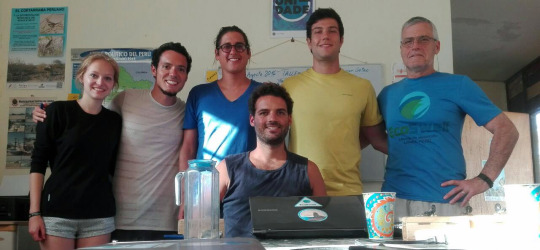
Team photo with the EcoSwell interns Ellen Jones, Zach Shank and his father, Rich.
As stated in my previous post, my time with Lobitos was about much more than just work. It was about exposing myself to new people and experiences, and learning from them. During my final days in Peru this was more prominent than ever. I was able to go fishing with Tullio, one of the local fishermen, before I left for the vacation of a lifetime, with my dad and his friend, down to Cusco, The Sacred Valley, Machu Picchu, and the Amazon Rainforest. From living with the hard working people of Lobitos to quietly observing a Harpy Eagle feasting on a fresh kill, I had the opportunity to experience the wide array of discovery that this beautiful country has to offer. This summer in Peru has allowed me to acquire a perspective on the world that I will carry with me for the rest of my life, back to school, in my travels, and in my professional life. I am extremely grateful for Diego, Andres, and Alejandro giving me the opportunity to experience what it's like to spend a summer living in their beautiful country while working towards helping others on a daily basis.
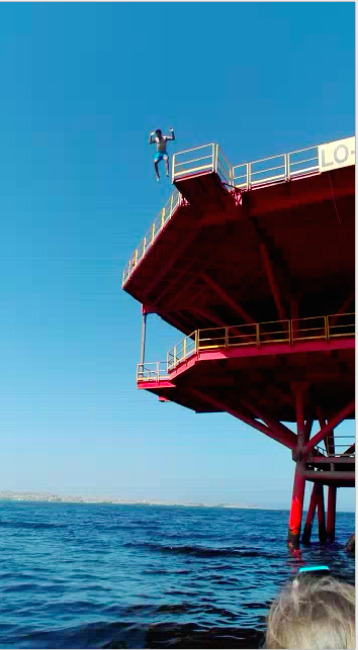
Zach dives from one of the oil platforms!
___________________________________________________________________
Un verano para recordar: El último mes de Zach Shank con EcoSwell
La última vez que escribí, el equipo EcoSwell y yo estábamos preparando un sistema de riego por goteo en nuestra casa, así como un taller para la comunidad acerca de esta técnica de riego sostenible. En las semanas siguientes hubo mucho progreso y descubrimiento en la EcoCasa y en mi propia vida. Organizamos el taller y hemos empezado a trabajar en un nuevo proyecto emocionante que tiene como objetivo la reforestación con plantas de Palo Negro en el área de Lobitos, en un esfuerzo para crear un hábitat adecuado para la Cortarrama Peruana, un ave endémica de la zona en vías de extinción. Además, durante mis últimos 10 días en Perú, he tenido la oportunidad de viajar por todo el país y de ver algunos de los productos más magníficos de la naturaleza y el hombre; en Cusco, el Valle Sagrado, Machu Picchu y la selva amazónica. Con esta experiencia termina mi estadía en Perú, que ha sido una experiencia incomparable. He aprendido mucho sobre las luchas que enfrentan muchos individuos en todo el mundo, lo que yo quiero hacer como carrera y como ser humano.
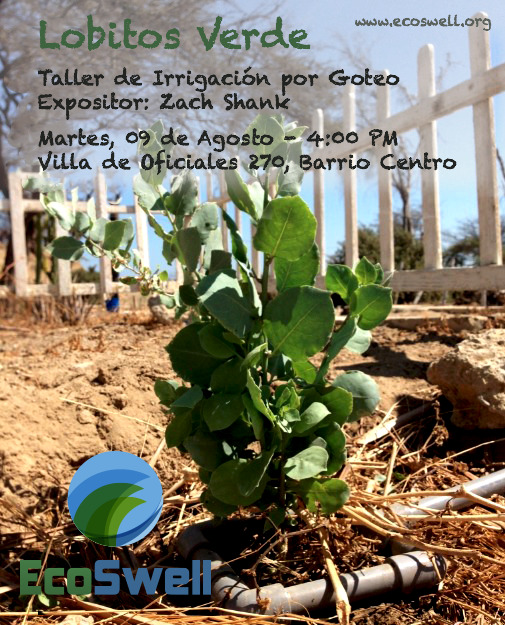
Publicidad para invitar a las líderes del Proyecto Lobitos Verde a participar del Taller de Zach
Pasé la a mayoría de mi último mes de trabajo en EcoSwell poniendo a prueba el nuevo sistema de riego por goteo, haciendo modificaciones, y trabajando en una presentación y preguntas para una discusión grupal que abarquen las funciones, beneficios y costos de varios tipos de riego por goteo. La sesión atrajo a cerca de 20 miembros de la comunidad, líderes del proyecto Lobitos Verde. Después de una presentación informativa y una demostración sobre cómo funciona el sistema de riego por goteo EcoSwell, se concedió la palabra al público. Los participantes mostraron inmediatamente su entusiasmo por los conceptos de riego por goteo en sus propios jardines, al ofrecernos buenas ideas para posibles mejoras. La conversación se convirtió rápidamente en una lluvia de ideas sobre cómo implementar el riego por goteo utilizando exclusivamente materiales reutilizados. Los participantes dibujaron diagramas en la pizarra blanca y todos colaboraron activamente acerca de cómo hacer un sistema eficiente y sostenible. Mis expectativas para este taller fueron manipuladas por los nervios que había acumulado, pues iba a dar una presentación entera de 30 minutos en un idioma que todavía estoy tratando de dominar. Luego me daría cuenta que los miembros de la comunidad fueron la fuerza impulsora detrás del éxito del taller, así como del proyecto en su conjunto. Al iniciar la conversación y proporcionar a los participantes la información y la nueva idea, yo simplemente sembré las semillas que se nutrieron por la creatividad y la reflexión de los participantes. Al concluir el taller cada participante salió con una única idea de cómo iban a hacer un Lobitos más eficaz y sostenible, y la comunidad más verde.
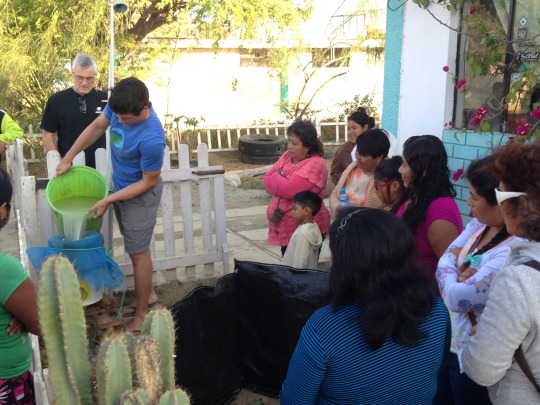
Zach demostrando el sistema de irrigación por goteo a las líderes del proyecto Lobitos Verde. A su lado está su padre.
Mi padre pudo venir Lobitos a tiempo para mis últimos días de trabajo, y su tiempo se convirtió en mucho más que vacaciones. Como miembro del Comité de Dirección de Conservación del Zoológico Columbus, pudo proporcionar al equipo EcoSwell orientación mientras desarrollábamos un perfil y redactábamos una propuesta para un fondo que ofrece este comité. La financiación se destinará a uno de nuestros proyectos cuyo enfoque es la conservación de la Cortarrama Peruana, una especie de ave en vías de extinción que vive a lo largo de la costa norte del Perú, y particularmente en la región de Piura. El equipo quiere lograr este objetivo mediante un proyecto conducido por la comunidad para la construcción de bancos de semillas para almacenar y cultivar semillas del Palo Negro, una planta importante para la supervivencia de la Cortarrama Peruana, y la plantación de estos árboles en toda la comunidad. Observar el entusiasmo de mi Papá mientras informaba al equipo sobre la manera de presentar el proyecto, sirvió como otra prueba del magnetismo de esta organización.
Como he dicho en mi último post, mi tiempo en Lobitos fue mucho más que sólo el trabajo. Implicó exponerse a nuevas personas y experiencias, y aprender de ellos. Tuve la oportunidad de ir a pescar con Tullio, uno de los pescadores de la zona, antes de salir para las mejores vacaciones de mi vida, con mi padre y su amigo, hasta llegar a Cusco, el Valle Sagrado, Machu Picchu y la selva amazónica. Desde la convivencia con las personas trabajadoras de Lobitos, hasta observar en silencio un Águila Harpía comiendo una matanza fresca, tuve la oportunidad de experimentar la gran variedad de descubrimiento que este hermoso país tiene que ofrecer. Este verano en Perú me ha brindado otra visión del mundo, que llevaré conmigo el resto de mi vida, de vuelta a la escuela, en mis viajes, y en mi vida profesional. Me siento muy agradecido a Diego, Andrés y Alejandro por darme la oportunidad de experimentar cómo es pasar un verano al vivir en este país hermosísimo mientras trabajas cada día para ayudar a otras personas.
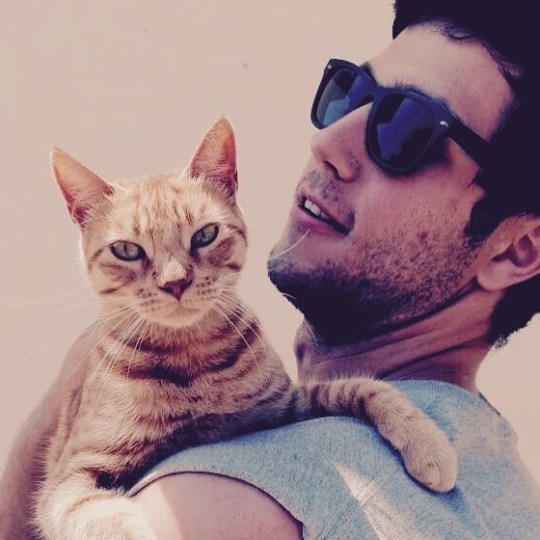
Nos vemos pronto Zach, TIniebli te manda saludos...
1 note
·
View note
Text
Internado de Investigación de Jorge
Mi nombre es Jorge Schwalb, soy de Lima, Perú y estudié Administración en la Universidad de Lima. Conocí EcoSwell a través de una charla que realizaron en la Universidad de Lima y me llamó la atención porque siempre quise tener la posibilidad de ayudar a una comunidad realizando algo que tenga un impacto positivo en ellos y no termine una vez que me fuera de ahí. Durante el mes de agosto de este año, pasé 2 semanas realizando un proyecto de investigación en Lobitos con ellos.
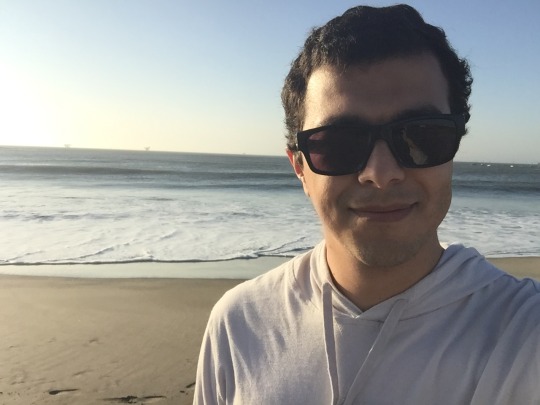
Foto: Jorge en la Playa Generales, a pocos pasos de la casa EcoSwell.
El objetivo principal de mi proyecto fue encontrarle un uso sostenible al Salón Comunal del Gremio de Pescadores de Lobitos, que tiene un panel solar y un biodigestor que no están siendo utilizados en su máxima capacidad. Comencé una investigación exploratoria en la cual buscaba definir cómo funciona la comercialización del pescado en Lobitos, así como todo el proceso de la pesca artesanal. Realicé entrevistas con dueños de hoteles, restaurantes, pescadores, intermediarios y gente relacionada a la industria pesquera, y me pareció increíble lo abiertos que son todos para escuchar ideas y dar su opinión al respecto, no hubo ni una persona con la que me haya querido reunir y se haya negado a hacerlo. Gran parte de esta apertura es gracias al equipo EcoSwell, que han realizado lazos fuertes con la comunidad y se han ganado la confianza de todos. Con estas entrevistas surgieron propuestas cuya viabilidad queda aún por analizar.
También tuve la oportunidad de apoyar en otros proyectos de EcoSwell como “Lobitos Verde”, ayudando a plantar, verificar el estado de las plantas de las familias que pertenecen al proyecto y entregando fertilizante para que se puedan desarrollar bien. Otro proyecto fue los “Wilipipes”, que son las tablas de mareas que usan los pescadores para determinar qué días son los mejores para salir a pescar o realizar tours. Estas tablas de mareas son colocadas en tres distintos puntos de Lobitos, el Salón Comunal del Gremio de Pescadores, el edificio del desembarcadero y el muelle artesanal.
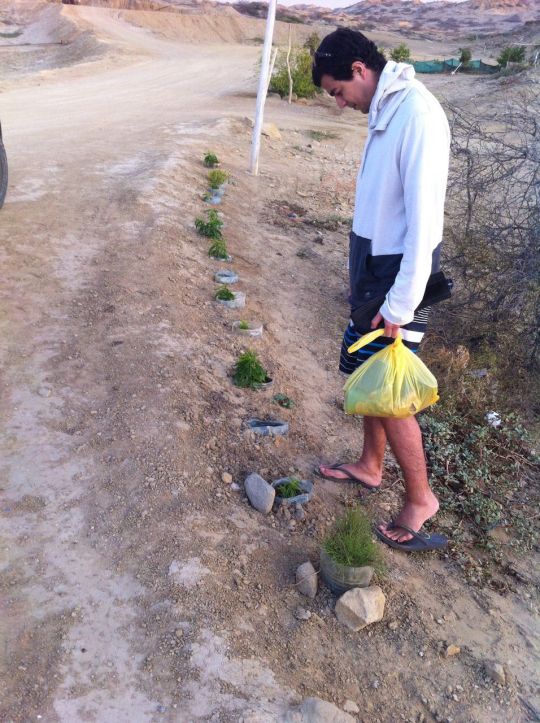
Foto: Jorge aplicando “mulch” a las plantitas del Proyecto Lobitos Verde
Aparte de los proyectos también he tenido tiempo para disfrutar de la playa, el clima y la gente. La playa de Lobitos es muy buena para correr olas y la mayoría de turistas van por eso, el agua es un poco fría pero con el calor de Piura se complementa bien. Un fin de semana nos fuimos a la playa “El Ñuro” que queda a 40 minutos de Lobitos, una playa conocida porque se puede nadar con tortugas que van ahí a comer cerca del muelle, tiene buenas olas y hay poca gente va a la playa, lo que lo hace perfecto para relajarte y pasar un buen rato.
El último día en Lobitos salimos a pescar con Tullio, un pescador artesanal, su hijo Antonio y Selcuk, otro voluntario de EcoSwell. Salimos 5:45am y navegamos por una hora y pescamos cerca de dos horas y media, luego Tullio nos preparó Ceviche en el camino de regreso con el pescado que habíamos sacado. Luego paramos a ver los lobos marinos que se suben a las plataformas petroleras y cuando estábamos regresando al muelle vimos a dos ballenas muy cerca de nosotros y las perseguimos por un rato hasta que les perdimos el rastro, una muy buena experiencia.
La gente en la casa EcoSwell me trató increíble, tienen una actitud demasiado positiva, una pasión enorme por ayudar a la comunidad de Lobitos y me han apoyado en todas las fases de mi proyecto. Es increíble todo lo que han logrado en Lobitos a pesar de todas las adversidades que tiene la comunidad, como el poco apoyo del Estado y problemas entre algunos pobladores y la Municipalidad.
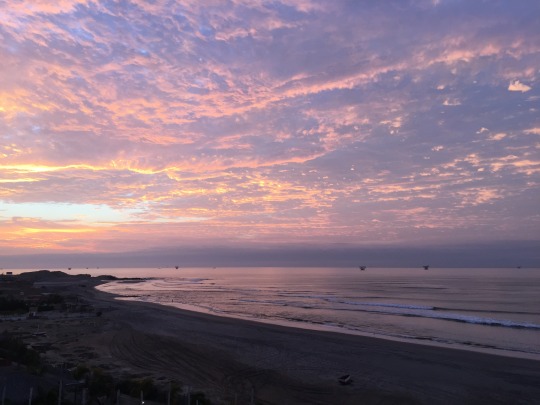
Foto: Atardecer Lobiteño captado por Jorge.
¡Ha sido una muy buena experiencia y espero poder regresar pronto!
--------------------------------------------------------------------------------------
Jorge’s Research Internship
My name is Jorge Schwalb, I'm from Lima, Peru, and studied Business Administration at the University of Lima. I was 2 weeks in Lobitos as a volunteer with EcoSwell, I met them through a talk held at the University of Lima and it caught my attention because I always wanted to be able to help a community doing something that has a positive impact on them and not end once I left there.
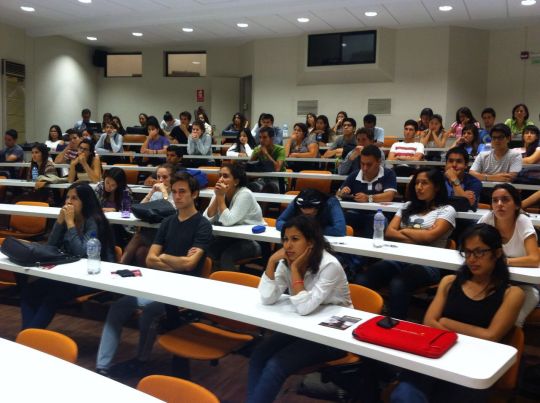
Photo: Volunteering Program presentations at the University of Lima.
The main aim of my project was to find a sustainable use for Fishermen’s Guild Community Hall, which has a solar panel and a biodigester that are not being used at full capacity. For that I began exploratory research which sought to define how fish commerce in Lobitos works as well as the whole process of artisanal fishing. I did interviews with owners of hotels, restaurants, several fishermen, traders and people related to the fishing industry, and I found it amazing how open they are all to hear ideas and give their opinion, there was not a single person with who refused to do so, much of this thanks to the EcoSwell team who have made strong ties with the community and have earned the confidence of all. With these interviews came up proposals that now need to be analyzed for viability.
I also had the opportunity to support other projects of EcoSwell as "Lobitos Verde" helping to plant, check the plants of families that were involved in the project and delivering fertilizer so they can develop well. Another project was the "Wilipipes" which are the tide tables used by fishermen to determine which days are best to go fishing or make tours for visitors. These tide tables are placed in three points in Lobitos, the Community Hall, the fishing pier and the docks.
Apart from the projects I also had time to enjoy the beach, climate and people. The Lobitos beach is very good for surfing, most of the tourists visit for that reason, the water is a little cold but it complements well with the Piuran sun. On one of the weekends we went to the beach “El Ñuro” which is 40 minutes north from Lobitos, it’s a popular beach because you can swim with turtles that go there to eat next to the pier, there’s also good waves and few people go there, so it’s perfect to relax and have a good time.
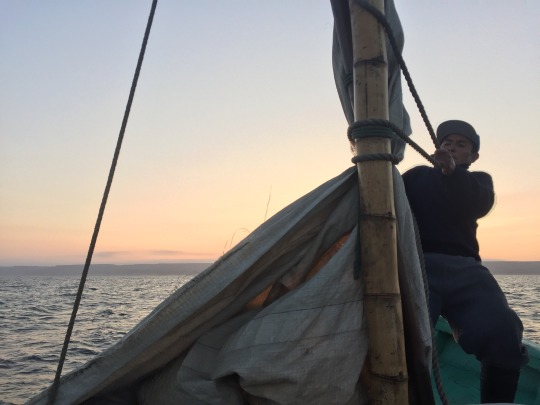
Photo: Tullio preparing the artisanal boat for the morning fishing.
The last day at Lobitos we went fishing with Tullio, an artisanal fisherman, his son Antonio and Selcuk, another volunteer from EcoSwell. We arrived at the pier at 5:45am and sailed out for an hour into the sea, where we fished for about two and a half hours. On the way back Tullio made Ceviche with the fish we had caught, then we stopped to watch the sea lions at the oil platforms, and when we were returning to the dock we saw two whales very close to us, an amazing experience!
People at the EcoSwell house treated me unbelievably well, they have an incredible positive attitude, a passion for helping the community of Lobitos and have supported me in all the phases of my project. It's amazing what they have accomplished in Lobitos despite all the adversity at the community, like the little support they have from the Government and the problems that exist between som. e residents and the Municipality.
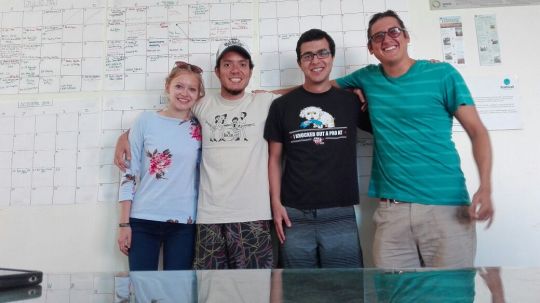
Photo: Jorge’s last day, picture with the team.
It has been a very good experience and I hope to return soon!
1 note
·
View note
Text
Ellen’s Volunteering Experience
This summer I have spent an insightful three weeks carrying out my Geography dissertation research with EcoSwell in Lobitos on the northern coast of Peru. With my research topic being “An investigation into the interactions of scientific and traditional knowledges in the context of a climate change mitigation project in Lobitos, Peru,” I have been involved with Lobitos Verde, EcoSwell’s reforestation project. The team have been working on and developing this permaculture programme for over a year now and have had fantastic results in greening the arid environment through community engagement and educational workshops. With a strong focus on the participation of women, the project promotes the reuse of greywater to irrigate plants with the eventual aim of “greening” the dry, desert landscape whilst empowering the women to take pride in their plants and gardens. This also aims to increase the local community’s resilience to drought events which are predicted to rise in frequency as a result of increasing anthropogenic climate change, thus making Lobitos vulnerable to scarce water resources. This highlights the relevance and importance of the Lobitos Verde project to the local environmental and social context of Lobitos.
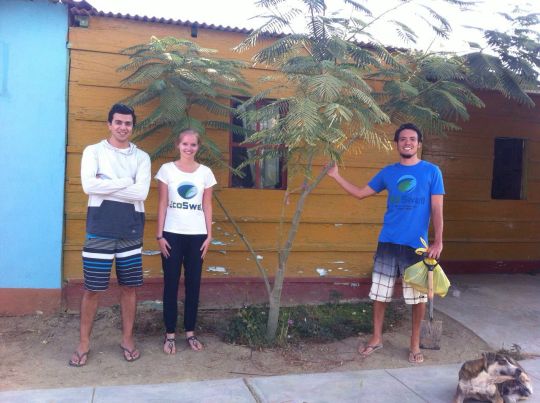
Photo: Ellen, Jorge and Diego with one of the Lobitos Verde flame trees
I was lucky enough to have the opportunity to take part in the house to house visits where we helped the families to build wind barriers for the plants that EcoSwell have provided them using completely recycled, locally available materials and put mulch to reduce evaporation, fertiliser and water on the plants. Many of the participants were kind enough to let me interview them, with the help of Alejandro translating, and it was great to hear how happy the project has made the women and their families feel as it has allowed them to save water and become a community proud of their plants. Clearly, Lobitos Verde has a life changing impact, not only on the environment, but also the people of Lobitos themselves.
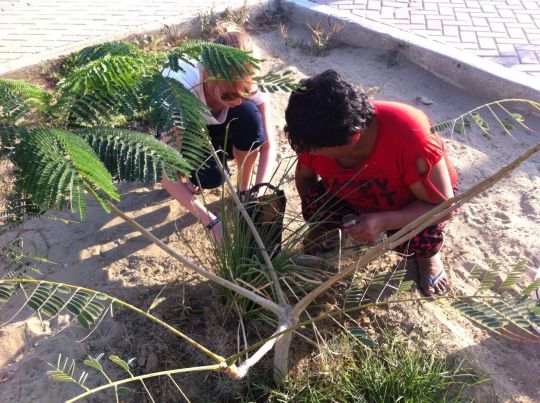
Photo: Ellen helping Teresa fertilize her flame tree.
During my stay in Lobitos, we also held a drip irrigation workshop at the EcoSwell house which was run by another volunteer, Zach. He had been working alongside the EcoSwell team to build a cost effective micro irrigation system as a mini subproject of Lobitos Verde at the EcoSwell house to present at the workshop. We had a great turn out from the community and many of the women provided us with a range of other initiatives for drip irrigation using simple materials such as plastic bottles. It was insightful to see how EcoSwell and the community learn from each other on such a personal and direct level, and this workshop really reflected the great extent to which the local community are engaged with the project.
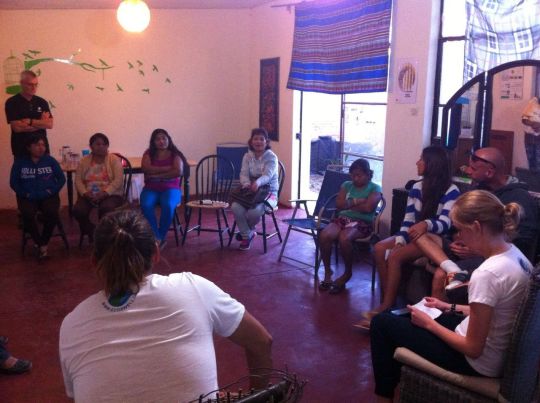
Photo: Ellen conducting a mini focus group during the Drip Irrigation Workshop.
I was also fortunate enough to begin working on structuring and planning a grant proposal for a project aiming to promote the conservation of the Peruvian Plantcutter (known as the Cortarrama in Spanish). This endangered bird species is endemic to the desert region of the Peruvian coastline and there are estimated to be only 500 to 1000 individuals left in the wild due to threats such as deforestation and climate change. EcoSwell’s concept is to involve the local community in this issue by building and handing over the possession of greenhouses containing seedlings of the Palo Negro plant, which is a vitally important species to the Cortorrama’s habitat, to the families themselves. Here is yet another example of how the Lobitos Verde project is increasing in capacity by branching out even further into specific wildlife conservation techniques while empowering women to take such issues into their own hands. I´ll be excited to follow EcoSwell’s progress with this sub-project after learning so much about how vital the Cortarrama is to the local ecosystem.
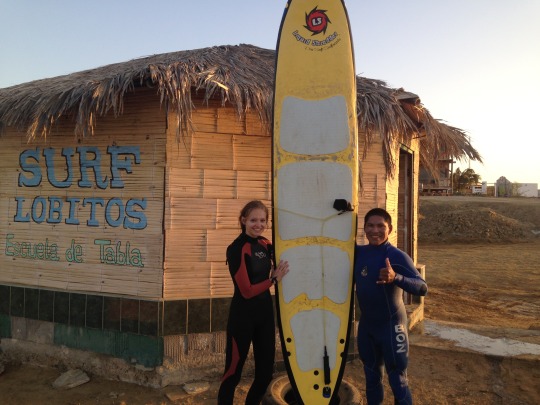
Photo: Ellen’s first surfing lessons with Gino Pérez
Living in the EcoSwell house with Diego, Alejandro and Andres is great – in the mornings we would usually work in the office after breakfast and the afternoons would consist of going out into the community, planting trees in the garden, going to the beach for a dip or having lunch at Tranqui’s restaurant. Also, with Lobitos having some of the best waves in the world and having never surfed before, I couldn’t miss this opportunity to learn a new skill! I had some great surfing lessons with Gino Perez from Surf Lobitos in the evenings – I had so much fun that I’m hoping to continue learning to surf when I get back to the UK (if the sea isn’t too cold!) Me, Alejandro, Diego and Zach also had the opportunity to go on a morning fishing trip with Tullio Chapilliquen who took us out on his boat one morning at sunrise. Despite the early start, the diverse range of marine wildlife such as pelicans, sea lions and even a humpback whale spotting woke us all up! Not to mention the freshly caught ceviche prepared by Tullio in lime juice with onions, garlic and spicy ají right on the boat, a traditional Peruvian seafood dish I’ve fallen in love with.
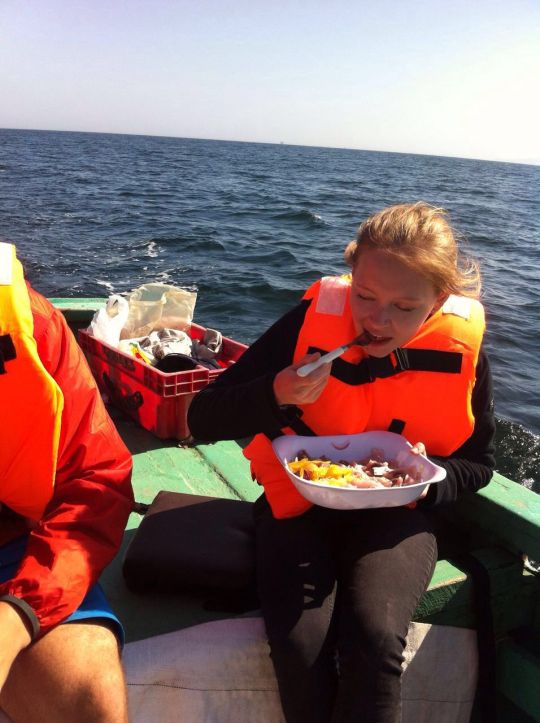
Photo: Delighted with the fresh ceviche prepared by Tullio Chapilliquén.
I also had the chance to venture outside of Lobitos a couple of times and explore a bit more of the northern coast region at weekends. For example, I helped out with the weekly shop in Talara buying fruit and vegetables in the market and Diego and I attended a bio-construction workshop at the University of Piura which was all about eco-friendly architecture and water filtering systems. On my final weekend, I went with Diego, Alejandro and the other volunteer Jorge to stay at his uncle’s holiday home just further up the coast in Ñuro for a night. Tourists flock to this town for its abundance of sea turtles in its warm ocean, thanks to the presence of the Equatorial current flowing from the north. So, we all had the chance to swim with these beautiful and surprisingly friendly animals that weren’t afraid to get up close to us!
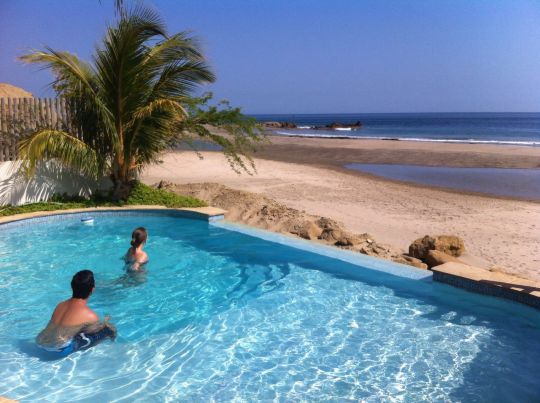
Photo: Weekend trip to El Ñuro.
Finally, EcoSwell’s “glocalisation” approach is all about contributing knowledge and adapting it to the socio-economic and environmental context of Lobitos and that’s exactly what the volunteer programme and EcoSwell’s hardworking multi-disciplinary team allow to happen. As a volunteer, the team at EcoSwell and the local people of Lobitos have been so helpful with the whole process of my research, and they have taught me so much about what it means to establish and run a sustainable development NGO. The Lobitos Verde project started with such a simple idea, but it is continuously expanding and growing like the seedlings that the team at EcoSwell and the families have planted together. Through EcoSwell’s bottom-up, “glocal” approach, they have successfully created a dialogue for entrepreneurship, sparking ideas and a collaborative passion to care for this beautiful town’s environment and people. EcoSwell have an incredibly exciting future ahead of them and I feel proud to be a part of their sustainable vision.
1 note
·
View note
Text
Zach’s First Month at EcoSwell
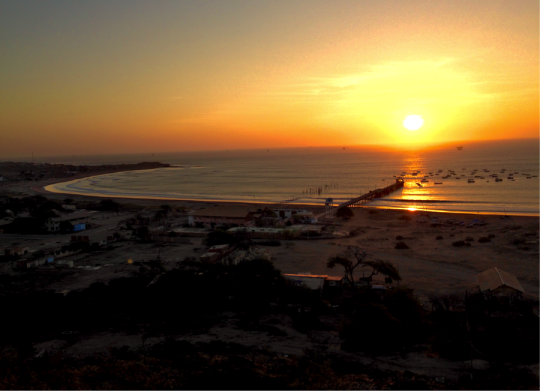
My name is Zach Shank, I am from Powell, Ohio, USA but I am currently a rising senior studying Geography and Environmental Studies at Dartmouth College in Hanover, NH. Today marks the conclusion of my first month working at EcoSwell – a month full of opportunity to expand my horizons. I have been introduced to new people, new food, new places, and new experiences – all of which have served as opportunities to educate myself as well as apply what I’ve learned at Dartmouth to the field. For the first week or so on the job, I worked with Andres, Alejandro, and Diego to design two posters for the Unidos por Lobitos project which had recently installed a photovoltaic system and wastewater biodigestor at the Salón Comunal del Gremio de Pescadores (Community Centre of the Fishermen’s Guild). The posters have been posted at the site of the projects in order to inform community members and visitors about the functionality, purpose, and benefits of the two recent installations. The most fulfilling parts of this project have been listening to the local Lobiteans ask and express their excitement about the solar panels and biodigestor, assuring us of the positive impact we were making on peoples lives. Andres and I have also been working on a few maintenance projects for the Salón Comunal including the construction of a fence to protect the biodigestor. An enjoyable part of this experience has been working with Juan Eche Ruiz, the President of the Fishermen’s Guild. Juan has exemplified the commitment and enthusiasm that the fishermen, and the community of Prima Vera – the fishermen’s neighborhood – have shown towards these projects with their persistence in staying involved as much as possible. More times than none, by the time Andres and I would arrive at the Salón, Juan would have already started the day’s work on the fence and various maintenance tasks we had to attend to.
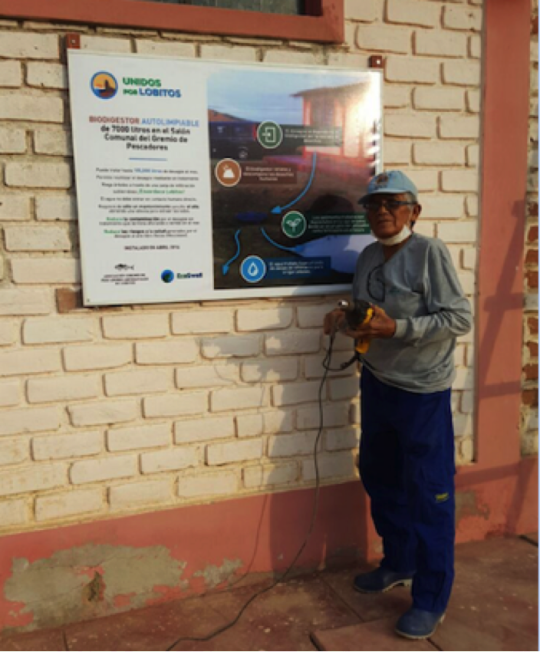
Another opportunity I have had in terms of being active in the community has been the Lobitos Verde project. In my time here, this project has consisted of working with 15 families to make the community greener by planting an Indian species of tree known as Neem, which is known for its drought resistance and uses as an insect repellent and medicine. I have especially enjoyed working with these families and seeing their willingness to take charge of this project and to better the community by providing more shade, greenery, erosion mitigation, and the various benefits of planting in such an arid region. The children have undoubtedly been the most enthusiastic about the project.
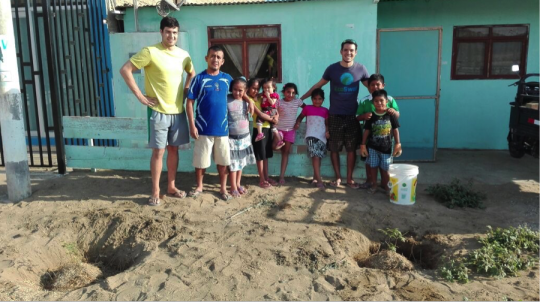
Additionally, I have had the pleasure of organizing a sub-project for Lobitos Verde with a micro-irrigation initiative here at the EcoSwell house that we hope to expand throughout the community. Micro-irrigation, or drip irrigation, is widely known as the most water efficient form of irrigation as water is protected from evaporating as it travels through tubing to the desired plants where it is emitted through tiny holes or carefully designed “emitters” that control the drip rate of the water. Working at a sustainable development NGO in an under-developed town such as Lobitos means that not only do we want to be cost effective and reduce our environmental impact, but also that we do not have access to a vast amount of resources, including these emitters. Instead, we constructed our drip irrigation system in a cost effective manner by using cheap PVC piping - with PVC valves to control water pressure and storage - that we have attached to a storage container that will accumulate gray water (used sink water) until we want to release it into the system when it is time to water the plants. The emitting pipes have also been covered with mulch to reduce evaporation and wind erosion even further. So far, we have been very satisfied with the results, as we have saved a noticeable amount of water, been more precise in irrigating our plants, and reduced the time and effort it takes to water the plants – all characteristics that we believe will appeal to and greatly benefit the community. Our next step is to start planning for a community workshop in which we will invite the Lobitos Verde families to the EcoSwell house for a presentation of the irrigation system as well as a cost benefit analysis and guidance in how to install systems at their own homes. We are hoping to make this another project in which we work in collaboration with the community to install and maintain such systems.
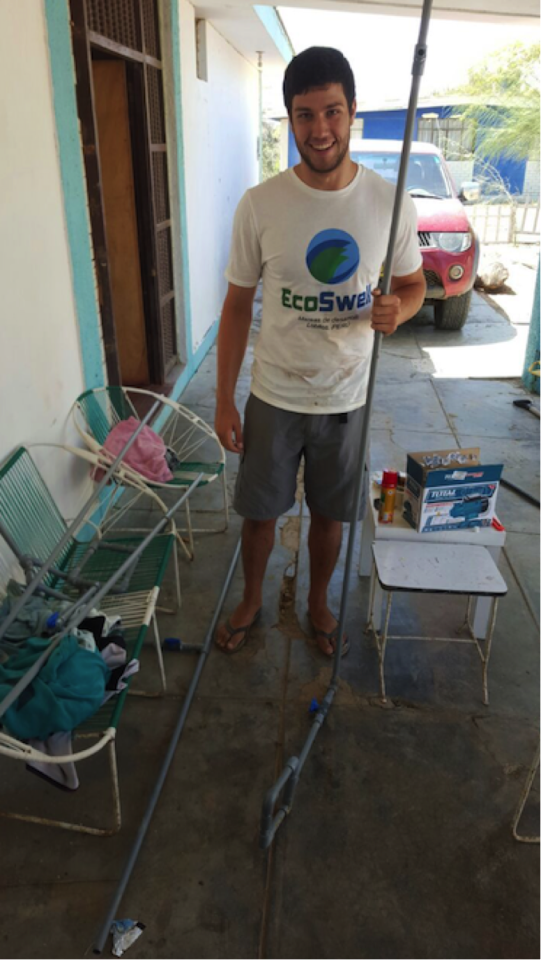
My work has been quite satisfying here, but I have also enjoyed a good amount of free time travelling with the guys and the other intern, Olivia, surfing, exploring, and just hanging out with the crew, and their two cats Tiniebli and Obi. For the fourth of July weekend, Olivia and I took a 3-day vacation at the party hostile of Loki in Mancora, Peru. Here we met people from all around the world, with interesting backgrounds and admirable passions in life, most which had ventured to Peru as part of multiple month long trips to explore the wonders that South America has to provide. Each and every conversation I had with these people provided me with a different perspective on life encompassed by a more free-willed and liberating approach. This really made me think hard about what Diego, Andres, and Alejandro have been doing for the past three years in Lobitos. Three childhood friends who found a small town along the northern coast of Peru with the loveliest of inhabitants, but also a community that could use the support of individuals who have devoted their lives towards improving and protecting it. What I have learned here has gone far beyond simply how to manage a sustainable development NGO. I have gained a perspective on life that proves that living a materialistic life does not always lead to happiness. Pure happiness comes from identifying and surrounding yourself with the people you value most in life, and knowing these people are aware of this value through what you have done for them. For EcoSwell, these are the hardworking and affectionate residents of Lobitos, Peru.
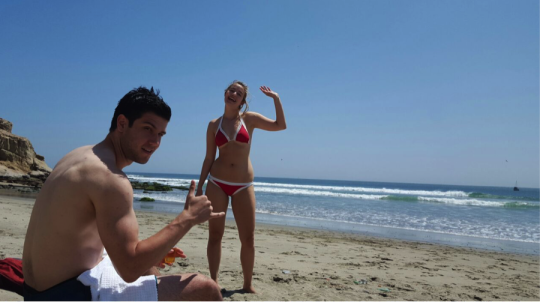
-----------------------------------------------------------------------------------------
El Primer Mes de Zach en EcoSwell
Mi nombre es Zach Shank y soy de Powell, Ohio, EE.UU., pero actualmente estudio Geografía y Estudios Ambientales en Dartmouth College en Hanover, New Hampshire. Hoy cumplí mi primer mes de trabajo con EcoSwell - un mes lleno de oportunidades para ampliar mis horizontes. Se me ha introducido a nuevas personas, nuevos platos, nuevos lugares y nuevas experiencias - todos han servido como oportunidades para educarme a mí mismo, así como para aplicar lo que he aprendido en Dartmouth al campo. Durante la primera semansa, trabajé con Andrés, Alejandro, y Diego para diseñar dos carteles para el proyecto Unidos por Lobitos. Recientemente se instaló un sistema fotovoltaico y un biodigestor de aguas residuales en el Salón Comunal del Gremio de Pescadores (Centro de la Comunidad de la Gremio de Pescadores). Los carteles se han publicado en el sitio de los proyectos con el fin de informar a la comunidad y visitantes sobre la funcionalidad, el propósito y los beneficios de las dos instalaciones recientes. Lo más satisfactorio de este proyecto ha sido escuchar a los lobiteños preguntar entusiasmados por los paneles solares y el biodigestor, asegurándonos del impacto positivo que estábamos haciendo en la vida de las personas. Andrés y yo también hemos estado trabajando en algunos proyectos de mantenimiento para el Salón Comunal, incluyendo la construcción de una valla para proteger el biodigestor. Una parte agradable de esta experiencia ha sido trabajar con Juan Eche Ruiz, el presidente del Gremio de Pescadores. Juan ha ejemplificado el compromiso y el entusiasmo que los pescadores y la comunidad de Primavera – el barrio de los pescadores - han demostrado hacia estos proyectos con su persistencia en seguir participando tanto como sea posible. Por lo general, cuando Andrés y yo llegábamos al salón, Juan ya había comenzado la jornada de trabajo en la valla y diversas otras tareas de mantenimiento que tuvimos que atender.

Otra oportunidad de trabajo comunitario que he tenido ha sido el proyecto Lobitos Verde. En mi tiempo aquí, este proyecto ha consistido en trabajar con 15 familias para hacer más verde la comunidad mediante la plantación de una especie en la India de árbol conocido como neem, que es conocido por su resistencia a la sequía y utiliza como repelente de insectos, y la medicina. He disfrutado especialmente trabajar con estas familias y ver su voluntad de hacerse cargo de este proyecto para mejorar la comunidad, proporcionando más sombra, vegetación, mitigando la erosión, además de diversos beneficios de la siembra en una región tan árida. Los niños han sido sin duda los más entusiasmados con el proyecto.
Además, he tenido el placer de organizar un sub-proyecto para Lobitos Verde con una iniciativa de micro-riego aquí en la casa EcoSwell que esperamos que se expanda por toda la comunidad. El micro-riego o riego por goteo, es ampliamente conocido como una forma eficiente de riego, ya que el agua está protegido de la evaporación a medida que viaja a través de tubos a las plantas deseadas, a las que se emite a través de pequeños agujeros cuidadosamente diseñados, llamados "emisores", que controlan la velocidad de goteo del agua. Queremos que los lobiteños adopten también el sistema de riego por goteo, pero debemos considerar su delicada situación económica, que no les permite acceder a todos los recursos. Por ello, hemos construido nuestro sistema de riego por goteo en una manera rentable mediante el uso de tuberías de PVC baratas - con válvulas de PVC para controlar la presión y almacenamiento de agua - que hemos unido a un recipiente de almacenamiento que se acumulan aguas grises (agua del lavabo) donde se almacena hasta la hora de regar las plantas, cuando baja el sol. Los tubos también se han cubierto con mantillo para reducir la evaporación y la erosión eólica aún más. Hasta ahora, hemos estado muy satisfechos con los resultados, ya que estamos ahorrando una cantidad apreciable de agua en el riego de las plantas, y se ha reducido el tiempo y el esfuerzo que se necesita para regar las plantas - todas las características que creemos serán de interés y beneficiarán a la comunidad. Nuestro siguiente paso es comenzar la planificación de un taller comunitario en el que vamos a invitar a las familias del proyecto Lobitos Verde a la casa EcoSwell para una presentación del sistema de riego, así como un análisis de rentabilidad y orientación en cómo instalar sistemas en sus propios hogares. Estamos esperando para hacer de este otro proyecto en el que trabajamos en colaboración con la comunidad de instalar y mantener tales sistemas.
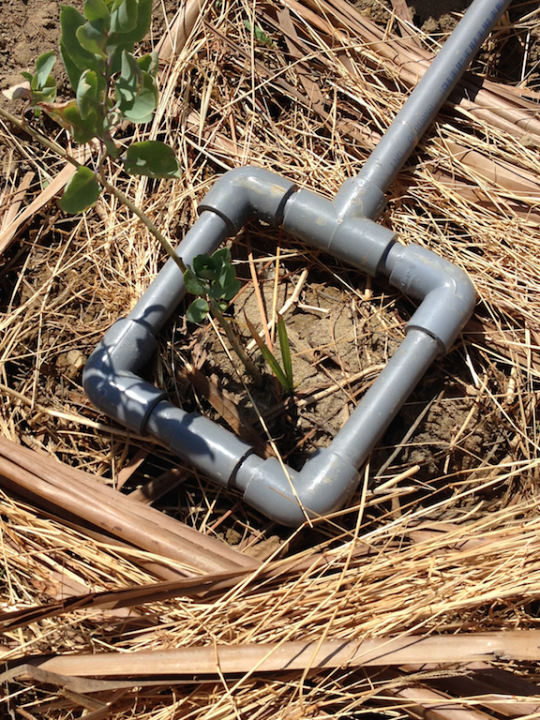

Mi trabajo ha sido bastante satisfactorio aquí, pero también he disfrutado de una buena cantidad de tiempo libre viajando, navegando y explorando con los chicos, la otra pasante, Olivia, y los dos gatos Tiniebli y Obi. En la cuarta semana de julio, Olivia y yo tomamos unas vacaciones de 3 días en el hostel Loki en Mancora, Perú. Aquí nos encontramos con gente de todo el mundo, con historias interesantes y admirables pasiones en la vida. Muchos se habían aventurado a Perú como parte de viajes de meses para explorar las maravillas que América del Sur tiene para ofrecer. Cada conversación que tuve con estas personas me proporcionó una perspectiva diferente de la vida abarcada en un enfoque liberador. Esto realmente me hizo pensar seriamente en lo que Diego, Andrés y Alejandro han estado haciendo durante los últimos tres años en Lobitos. Tres amigos de la infancia que encontraron una pequeña ciudad en la costa norte de Perú con los más bellos habitantes, y con una comunidad que podría utilizar el apoyo de personas que dedican sus vidas a su mejora y protección. Lo que he aprendido aquí ha ido mucho más allá que simplemente gestionar una ONG de desarrollo sostenible. He ganado una perspectiva de la vida que demuestra que vivir una vida materialista no siempre conduce a la felicidad. La más pura felicidad proviene de identificar y de rodearse de las personas más importantes en la vida, sabiendo que estas personas son conscientes del valor de lo que hace uno por ellos. Para EcoSwell, estos son los empeñosos y afectuosos residentes de Lobitos, Perú.
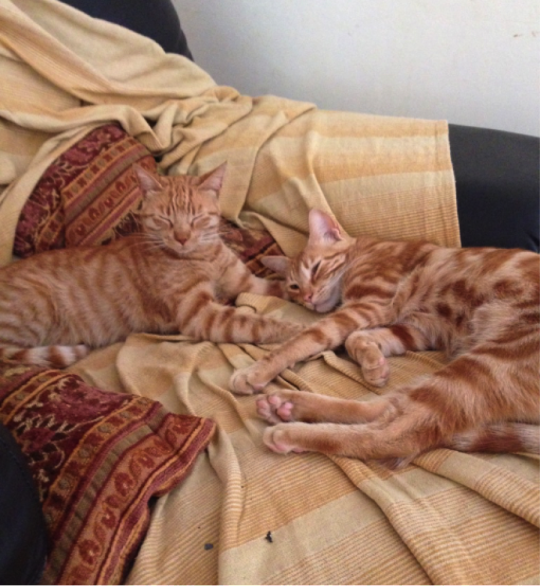
#ecoswell#volunteering#internships#local development#sustanability#experience#social#glocal#ngo#greening#environmental#lobitos#peru#north shore#pure happiness#tiniebli
0 notes
Text
Olivia’s EcoSwell Experience
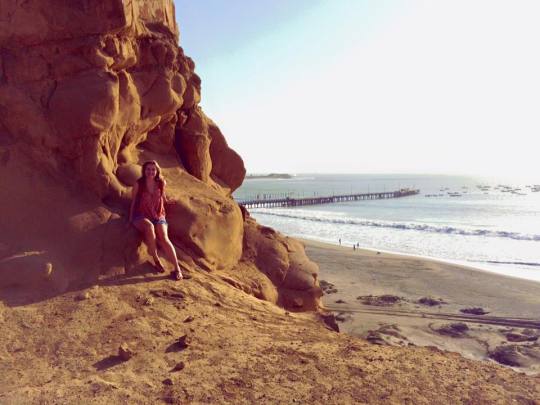
My 3 weeks volunteering with EcoSwell are drawing to a close and I’ll be headed back to the US. Lobitos is in the desert climate of northern Peru, most well known for it’s beautiful coastline and waves that attract surfers from all over the world. While I’ve been here I’ve been working mostly with the Green Lobitos program. This is a reforestation program which focuses on creating green spaces within the community, since its inception about a year ago, it has continued to grow like the tens of trees we’ve planted throughout the town. The 'amas de casa’ in the community have taken the lead on this project and recycle water that has been used for washing clothes or cleaning dishes to water the plants. They also reuse inorganic material to protect the plants from wind and other factors that could prevent potential growth - the aim is to implement permaculture and sustainability in every aspect of the town and in this sense, its the perfect project.

The best thing about my time here? Interacting with these families while tracking the success of this program or getting new members of the community involved has been a fantastic experience. It’s amazing to see how enthusiastic the kids are for this project, they often convince their parents to adopt the recycling techniques that are a part of this program. I’ve also been able to work on funding for an upcoming Surfonomics study. Simply put, this would put an economic value on the waves that bring in the tourism that many here rely on. As a result, this could be a great tool to convince business owners here to make more of an effort to conserve the beautiful and precious environment of Lobitos. There are only a handful of studies done like this in the world so we’re all excited to see how it goes!
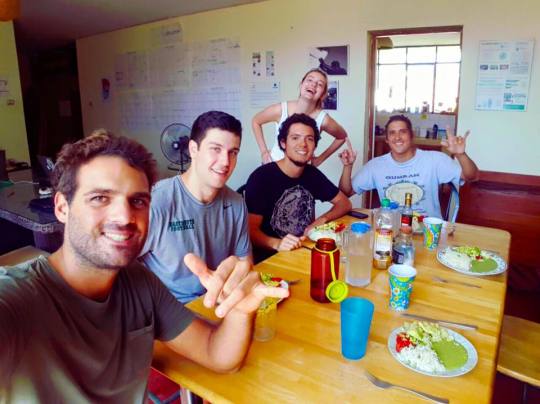
We work every day during the week, however the fun doesn’t stop there and outside of work I’ve been able to go surfing almost every day and have gotten some amazing lessons from a local surf instructor called Gino Perez from SURF LOBITOS. Our first weekend here we went to Cabo Blanco, home of “Panic Point” another huge surf spot and this past weekend we went to Máncora, a beach town about an hour away from here.
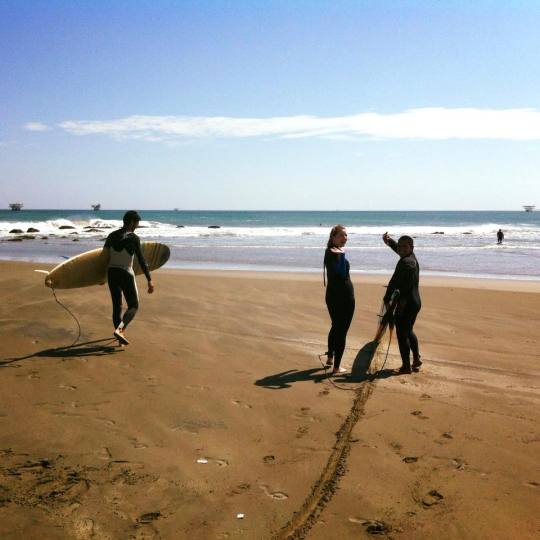
All around, it’s been a great experience! Thanks EcoSwell and a bright future is ahead.
Olivia DeRamus, Undergraduate student in Development and Political Economics with an emphasis on Latin-America, Pitzer College USA and Richmond University UK. July 2016
1 note
·
View note
Text
All for One and One for All
Dave ‘PermaDave’ Smith, 2015
PermArticles (3/3)
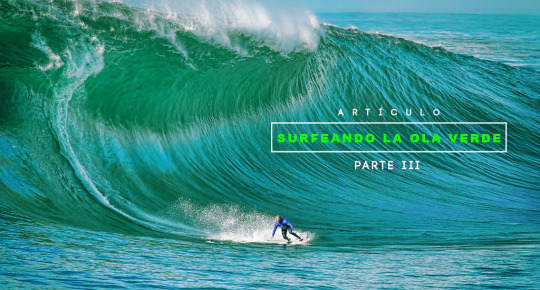
Nature is perfect because it shares. It shares the waves, it shares the air, it shares the people you love and doesn’t ask for anything in return. If we, as surfers, fight each other for the resources given to us, can we really represent nature?
This is the third in a series of articles trying to describe how we can incorporate some basic permaculture principles into the everyday lives of those of us who live “normal” lives in the city, working regular 9-5 type jobs. In the first articles we explored the idea of no waste, and how cyclic systems in contrast with linear systems can eliminate the production of waste. The second article looked at how we can turn a problem into a solution, by changing our perspectives on the situation for a more positive and productive outlook. Today I want to write about surplus.
It’s an interesting aspect of human psychology about the amount of “stuff” we own and how we compete with each other constantly to own more than the next person as if that somehow makes us better than them, or we will be happier if we have that next thing, that extra dollar, even if it means depriving others of it and even if it, ultimately, is to our own detriment.
Our modern society promotes savings and investments in preparation for a rainy day which we are forever living in fear of. The day that we lose our job, or need to pay for huge medical bills etc. We are encouraged through news and media and advertising to create a huge, thick financial and material buffer around ourselves to protect us from the unknown evils of the future.
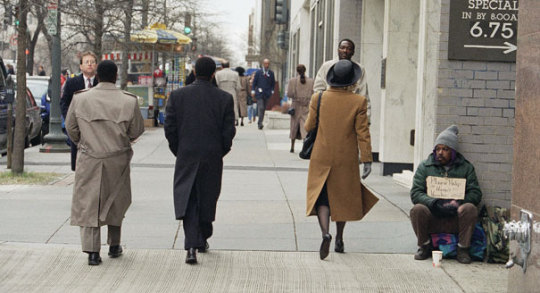
Sometimes the inequality in resource ownership, or those who clearly have surplus but are perhaps not aware of it and those who do not, is very clear from the outside. (Picture from www.taxfairness.ca).
This argument is valid to some extent. It is hard, therefore, to know when we have “enough” or our material possessions (including money) have entered into “surplus”. It is harder still to commit to sharing this surplus with those outside our immediate circle of friends and family, i.e. giving it away to someone else. How do we know we won’t need it tomorrow? Because the whole reason behind this hoarding is fear of the unknown, fear of being left without, in a dark and shadowy future, it is impossible to say you won’t need it. However, there is another way which means we would not need to concern ourselves with trying to decide if we would need it or not.
The Power of Community
Here in Lobitos we are lucky to have some elements of a great giving and receiving community, within the Lobitian fishing community. Every week all the fishermen from the town head down to the waters’ edge and help pull each other’s fishing boats out of the water for cleaning, or push them back in after cleaning. No one asks for anything in exchange. There is no money changing hands. There is simply an understanding that they need each other to perform this task, which they all need to do with their own boat every few weeks to stop the buildup of barnacles etc. on the hull.
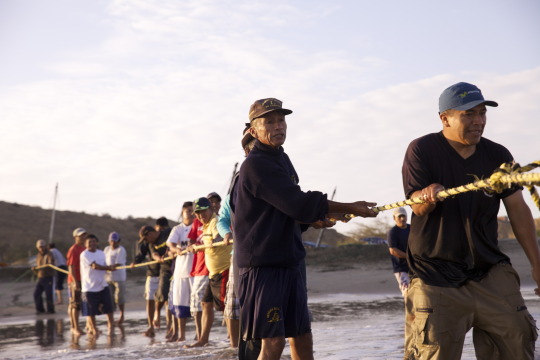
Fishermen in Lobitos working together to pull a fishing boat from the sea for cleaning. (Photograph by EcoSwell).
The idea to introduce mechanization to this task may sound good to some. It would certainly lower the labor requirement and make taking boats in and out of the water much easier. However there would be huge costs. Financially, yes. But significantly it would erode away the strong bond and sense of community that the fishermen have developed, as they would no longer rely on each other for this task.
I believe that this is what has happened in our cities where we no longer know our neighbors or those taking the same bus to work with us every day. Communities used to work together to carry out tasks either to benefit the community as a whole or individuals in turn within a community. This allowed them to form strong bonds of trust and friendship, where sharing resources (food, money, shelter etc.) with their neighbors, which was necessary even from a selfish point of view, as the individual may be the one in need next time. But now we compete with everyone around us to keep ourselves just ahead of the next person, or in an attempt to achieve that; putting our neighbor down to advance a little further ahead ourselves. However, this works both ways with others pushing us back to advance themselves and creates a vicious cycle and a very negative collective psyche.
This theory is explained in a simplistic way in the movie Beautiful Mind in this scene: https://www.youtube.com/watch?v=vCyZvfRHkC4
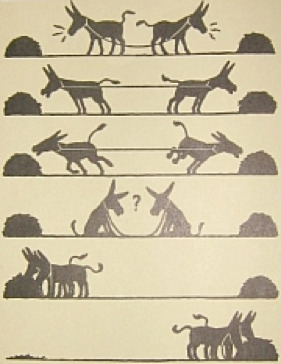
Sometimes working only for ourselves, against each other can be a lot of effort and yield little. While working together , can be beneficial to us as individuals, as well as to others in our community. (Picture from www.biggsuccess.com).
But what if our society returned to operate in a more sharing way? It is possible. One person at a time, one gesture at a time. It starts with you. How about giving right of passage to that other car next time you are sat in traffic, allow the pedestrian to cross the road ahead of you instead of accelerating at them, be more accepting of others in your next surf session and don’t jump the lineup, give your old board and/or wetsuit to someone who is just getting into surfing, even giving some of your time to teach and encourage them. There is an infinite number of examples from tiny gestures of good will, to huge offerings or selfless deeds. These examples are simply to suggest easy ways to begin.

A good example of everyone working solely towards their own goals and ultimately hindering themselves and everyone else at this road junction. (Picture from www.toosoffbowlines.com).
I want to end this with a quote I like but only recently found which is on a similar theme. It’s a good one to think about. Imagine if everyone had this approach to the material goods in their lives!
“The only time you look in your neighbor's bowl is to make sure that they have enough. You don't look in your neighbor's bowl to see if you have as much as them.”
― Louis C.K.
________________________________________________________________
About the Author: Dave Smith is studied Environmental Sciences (BSc) and Forestry (MSc) in the UK. After completing his studies of Design for Permaculture in Design Visions, he travelled around the world in order to learn about the different ways in which permaculture is being used in different social, cultural and environmental contexts. Whilst living in Lobitos, in Northern Peru, he worked with the NGO, EcoSwell, linking closely with the community starting a project of zero-cost reforestation with local fishermen.
Dave is currently based in Nepal where he is setting up a small business specialising in handmade products and operating by permaculture principleshttp://khalikhutta.com/
Written by: Dave Smith / EcoSwell
Todos para uno y uno para todos
Dave ‘PermaDave’ Smith, 2015
PermArticles (3/3)
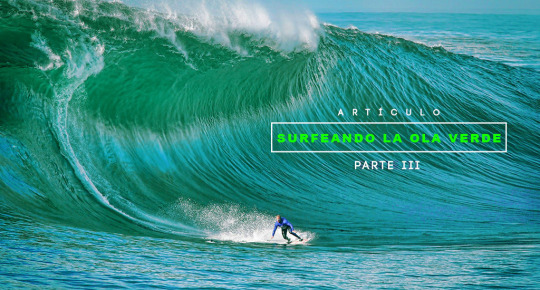
La naturaleza es perfecta porque comparte. Comparte las olas, comparte el aire, comparte a las personas que amas y no exige devoluciones. Si nosotros, como surfistas, nos peleamos por los recursos que nos brinda, ¿podemos representarla?
Este es el tercero de una serie de artículos que describen cómo podemos incorporar algunos de los principios básicos de la permacultura en nuestra vida diaria, incluso si vivimos en la ciudad, trabajando a tiempo completo. En el primer artículo exploramos la premisa que “nada es desechable”, y cómo los sistemas cíclicos pueden eliminar la producción de desperdicios, a diferencia de los sistemas lineales. En el segundo artículo se enfocó en la estrategia de convertir todo problema en una solución mediante una perspectiva positiva que permita visualizar resultados productivos. Hoy día quiero escribir acerca del exceso.
Un aspecto interesante de la psicología humana es aquella competencia constante por tener más que la persona de al lado, como si tener esa última cosa, ese dólar extra, nos hiciera mejores o más felices. Acumulamos a pesar de que esto pueda implicar privar a otros de tener estas cosas y a pesar que, en última instancia, pueda perjudicarnos.
Nuestra sociedad moderna promueve los ahorros e inversiones en preparación para los días lluviosos que anticipamos temerosos eternamente: El día en que pierda mi trabajo, el día en que tenga cuentas médicas enormes, etc. Los medios de comunicación, las noticias y la publicidad nos alientan a crear un grueso amortiguador material y financiero para protegernos de males desconocidos en el futuro.
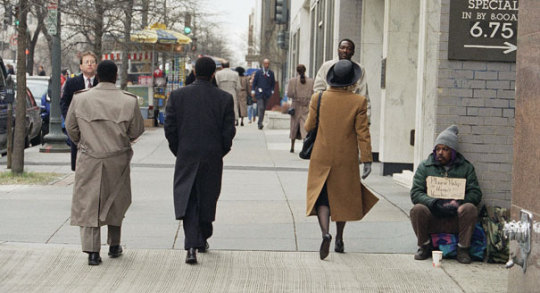
A veces, la desigualdad en la propiedad sobre los recursos puede no ser evidente para los que poseen el excedente, pero resulta clarísima desde afuera (Imagen de www.taxfairness.ca)
Este argumento es válido hasta cierto punto, por lo que se hace difícil saber cuándo tenemos las “suficientes” posesiones materiales (incluyendo el dinero) o si estas se han convertido en “exceso”. Es aún más difícil comprometerse a compartir ese excedente con personas que estén fuera de nuestro círculo de familiares y amigos.
¿Cómo sabemos que no lo necesitaremos mañana? La razón por la que acumulaste, en principio, es el miedo a lo desconocido, el miedo a quedarse corto, en un futuro oscuro y tenebroso es imposible saber qué no vas a necesitar. Sin embargo, hay otra manera en que no necesitamos preocuparnos en decidir si lo necesitaremos o no.
El Poder de la Comunidad
En Lobitos tenemos la suerte de encontrar elementos de reciprocidad dentro de la comunidad pesquera. Cada semana, los pescadores del pueblo se aproximan a las orillas para ayudar a sus compañeros con el varado de los botes para que puedan limpiarlos y hacerles mantenimiento. Nadie pide nada a cambio ni se intercambia dinero. Simplemente hay un acuerdo por el cual se requiere el esfuerzo comunitario para llevar a cabo esta tarea, necesaria para cada embarcación. Cuando ellos requieran el mismo favor por parte de la comunidad, podrán también contar con ella.
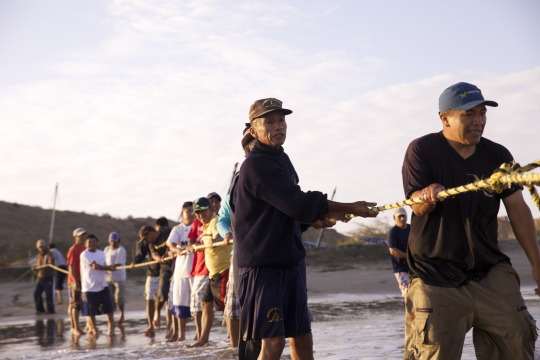
Pescadores en Lobitos trabajando juntos para jalar un bote pesquero desde el mar para darle mantenimiento. (Fotografía de EcoSwell)
La idea de introducir un mecanismo que realice esta tarea automáticamente puede sonar buena para algunos. Definitivamente reduciría la necesidad de tanta mano de obra y haría del varado una tarea más fácil. Sin embargo, habrían costos enormes para la comunidad, además de los financieros. Al mecanizar la tarea de varado, se mermaría ese fuerte lazo, ese sentido de comunidad que han desarrollado los pescadores, pues ya no se requerirían los unos a los otros para realizar esta labor.
Creo que esto es lo que pasa en nuestras ciudades, en las que no conocemos a nuestros vecinos o a las personas que toman el bus con nosotros todos los días. Las comunidades solían realizar tareas que benefician a toda la comunidad o a individuos por turnos (en el Perú, se denomina la “Minka”). Esto les permitía formar fuertes lazos de confianza y amistad, compartir sus recursos (comida, dinero, techo, etc.) con sus vecinos si era necesario, y esto era provechoso incluso desde un punto de vista egoísta, pues uno podía necesitar la ayuda en el futuro. Pero ahora competimos con todas las personas que están a nuestro alrededor, tratando de mantenernos por encima de ellos, dándoles la espalda para poder nosotros avanzar un poco más. Asimismo, nos toca sufrir a otras personas que nos empujan hacia atrás para ellos estar más adelante, creándose un círculo vicioso que resulta en una psique colectiva negativa.
Esta teoría se explica de manera muy simple en la película “Una Mente Brillante” en la siguiente escena: https://www.youtube.com/watch?v=vCyZvfRHkC4
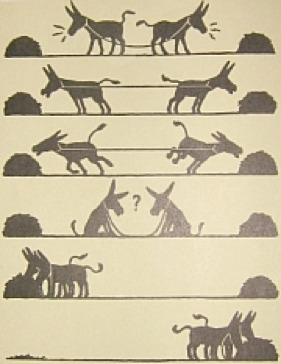
A veces, trabajar individualmente y en contra del otro puede involucrar demasiado esfuerzo y reportar pocos beneficios. Cuando trabajar juntos nos puede beneficiar tanto individual como comunitariamente. (Imagen de www.bigsuccess.com).
¿Qué pasaría si nuestra sociedad regresara a operar de una manera más colaborativa?
Es posible. Persona por persona, gesto por gesto. Y empieza contigo. Podrías empezar dejando pasar a otro carro la próxima vez que estés en el tráfico, o dejar pasar a los peatones antes que tú. Podrías tratar de ser más tolerante con las personas que están surfeando contigo, respetar el line-up, regalar tu tabla o wetsuit viejos a alguien que quiera aprender a surfear, o incluso dando tu tiempo para enseñarle o, simplemente, llevarlo contigo y alentarlo. Hay un sinnúmero de ejemplos, que van desde pequeños gestos hasta grandes ofrendas desinteresadas. Los ejemplos que les he dado son sólo sugerencias de cómo podemos empezar.

Un buen ejemplo en el que todos los individuos persiguen objetivos propios y, en última instancia, generan trabas para sí mismos y para todos los presentes en este cruce (Imagen de www.toosoffbowlines.com)
Quisiera terminar con una cita respecto de un tema parecido que encontré recientemente. Es una que hace pensar. ¡Imaginen que todos tuvieran este acercamiento hacia los bienes materiales en sus vidas!
“La única vez que miras el plato de tu vecino es para asegurarte que tengan suficiente. No miras el plato de tu vecino para asegurarte de tener tanto como ellos.”― Louis C.K
________________________________________________________________
Sobre el autor:
Dave Smith: Es un Bachiller en Ciencias Ambientales y Máster en Ciencias Forestales del Reino Unido. Luego de completar un curso de Diseño para la Permacultura en Designed Visions, inició un viaje alrededor del mundo para aprender las maneras como la permacultura esta siendo utilizada en diferentes ámbitos sociales, culturales y ambientales. Mientras vivió en Lobitos, en el norte del Perú, trabajó con la ONG EcoSwell, iniciando un proyecto de reforestación a costo cero con la comunidad pesquera, en el que se trabaja directamente con la comunidad a nivel de vivienda
Actualmente Dave está trabajando en Nepal, donde ha creado una pequeña empresa que se specializa en la fabricación de productos artesanales y que opera según los principios de la permacultura.http://khalikhutta.com/
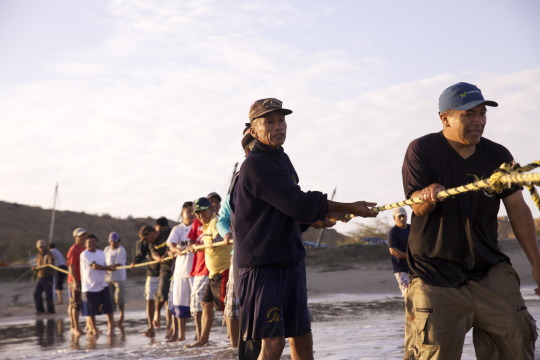
0 notes
Text
Turn a problem into a solution
Dave ‘PermaDave’ Smith, 2015
PermArticles (2/3)

This is the second in a series of articles trying to describe how we can incorporate some basic permaculture principles into the everyday lives of those of us who live “normal” lives in the city, working regular 9-5 type jobs. In the first articles we explored the idea of no waste, and how cyclic systems in contrast with linear systems can eliminate the production of waste. In this article I focus on the permaculture principle of turning a problem into a solution.
So what does that mean?
In land-based permaculture, (often with a strong focus on food production), problems and solutions might be linked like this:

But how about in “the real world” that most of us live in?
We all have bad things happen to us, or “problems” occur, from time to time. From missing a bus to having an altercation with a friend of colleague, or being outside of our comfort zone for whatever reason. When this happens, it’s easy to feel disheartened, worried or even angry. But if we are able to find the new potential and opportunities in these unexpected situations, this can help us face them better and even benefit.
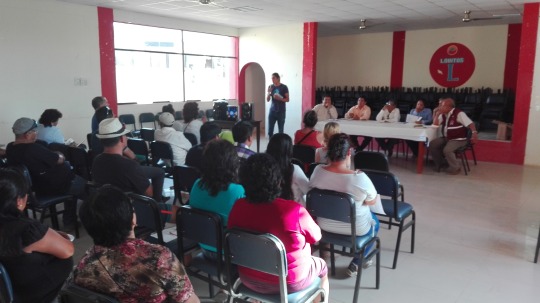
A problem is just an opportunity in disguise! For EcoSwell, the imminent arrival of the El Niño phenomenon was the starting point which led to neighbours, civil associations, public and private institutions coming together.
The Answers are Blowing in the Wind.
A good friend of mine has utilised this principle in a fantastic project in Upper Mustang – a remote, high altitude region in the Himalayan country of Nepal. The region has extremely high winds all year round, to the extent that it is difficult to grow any crops. Using an open source wind turbine design by Hugh Piggott, he has installed a single wind turbine in a small village. This village lacks electricity and other basic infrastructure, but thanks to this wind turbine (which also used some reclaimed material in its construction!) has allowed the installation of some light bulbs; some in houses and some on main streets. This has changed the lives of people in the village significantly and is a great example of various permaculture principles coming together.
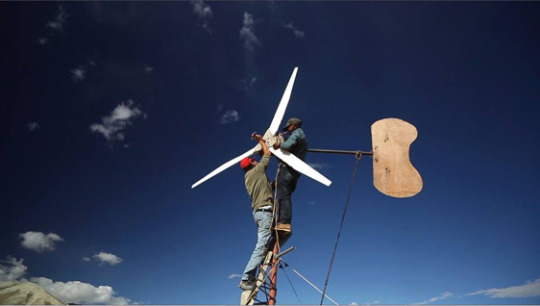
Tashi and Jeevan installing the wind turbine in the village of Namdok, in Nepal. (Photograph taken from the FaceBook page for Tashi’s Turbine).
This approach can be applied to everyday life too.
When I graduated from my undergraduate degree I had been given a job with a good environmental consultancy company with whom I had worked for a year during my studies. While my classmates were applying for jobs, I was calmly enjoying the last few months of university safe in the knowledge I was already employed come the end of my studies. However, when that time came, due to the economic situation in the UK and Europe, my job offer was retracted. I was distraught.
All this time I had been quietly smug about having a job safely organised while my classmates worried and attended interviews all summer. Now they were all going off for their first days in the jobs they’d gained. While I wrote letter after letter to every relevant company I could find, always to be told no. I had a few interviews the weeks and months passed and still nothing came. This was a big problem. My whole life was going off track. I saw no opportunity in this. No silver lining or chance to benefit. The dream job I had been given had been taken from me before I started it and now I was living at home with my parents unable to find work.
I ended up taking a job at a climbing wall teaching kids to rock climb. At the time this seemed like a short term job to fill in the time and give me some money and activity during my period trying to find a “proper” job. But this was the turning point for me, although I couldn’t see it at the time. I worked for nearly 2 years and loved it. It later allowed me to gain qualifications in climbing instructing and has enabled me to find rewarding and enjoyable work all over the world. I left the wall to do an MSc in forestry which led me into various jobs that have allowed me to live and work in interesting and beautiful places in different countries and work towards goals that I feel much more in my heart than I would have working at a consultancy firm.
All in all, not getting that environmental consultancy job was probably a great blessing and has opened up many doors for me. It was a huge “shake” to my plan and how I had anticipated and hoped for things to work out. But often great changes, although difficult or even painful at the time, can reveal massive rewards in the longer term.

It can be easy to get bogged down with negative thoughts when things do not go our way. But trying to stay positive can help us to see the opportunities within the new situation. Focus on the opportunities and problems will not be problems any more. (Picture from www.surfsplendorpodcast.com).
When a “problem” occurs it is usually simply a course of events or a singular event that we had not expected, planned for or desired. It can catch us unaware and so we fear it and call it a problem that needs to be changed back to how we had expected or hoped things would be. However, if we accept that it is how it is, then we can be granted an opportunity to approach it from a different angle. To try to see the new situation from a different view point. This unexpected situation may yield new and positive opportunities which we had not thought of, or expected. It may even turn out to be a blessing in disguise and give better results than if things had “worked out”. Although these results may be beneficial in a different area than the original, intended output/result. We may not be able to change the situation, but we can change how we react to it.
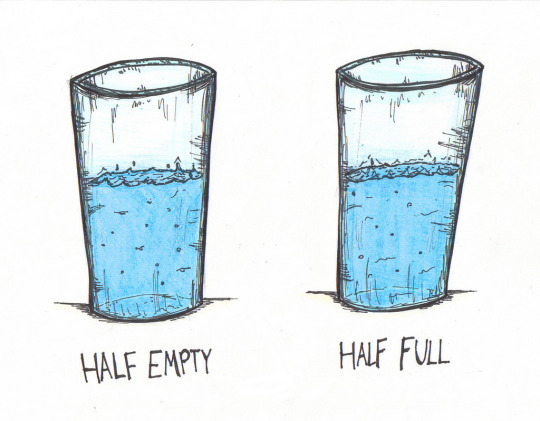
Staying positive in the face of change can make a huge difference in seeing the positives! (Picture from www.staticflickr.com)
Take Assertive Action
This is not to say you must follow the status quo and just float along with whatever happens however. This would be a sad way to live and is not the way of permaculture. The point is not to despair when things to do not work out the way we had hoped. Not to be too focused on the outcome that we wanted but didn’t get. That there may be other equally, or even additionally beneficial outcomes that we had not thought of or anticipated. We simply need to change the way we look at the situation in order to see these positives, adapt our plan/course of action to engage with the new situation, reassess and keep going
________________________________________________________________
About the authour: Dave Smith studied Environmental Sciences (BSc) and Forestry (MSc) in the UK. After completing his studies of Design for Permaculture in Design Visions, he travelled around the world in order to learn about the different ways in which permaculture is being used in different social, cultural and environmental contexts. Whilst living in Lobitos, in Northern Peru, he worked with the NGO, EcoSwell, linking closely with the community starting a project of zero-cost reforestation with local fishermen.
Dave is currently based in Nepal where he is setting up a small business specialising in handmade products and operating by permaculture principles http://khalikhutta.com/
Written by: Dave Smith / EcoSwell
Convertir un problema en una solución
Dave ‘PermaDave’ Smith, 2015
PermaArtículos (2/3)
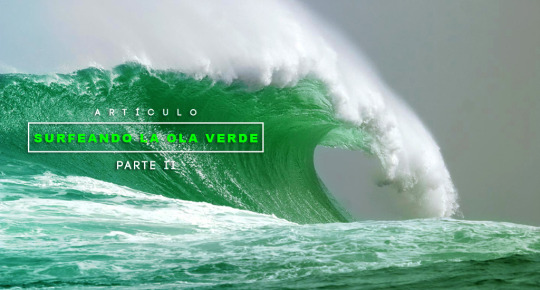
Este es el segundo de una serie de artículos que tratan de describir cómo podemos incorporar algunos de los principios básicos de la permacultura en nuestra vida diaria, incluso si vivimos en la ciudad, trabajando a tiempo completo. En el primer artículo exploramos la premisa que “nada es desechable”, y cómo los sistemas cíclicos pueden eliminar la producción de desperdicios, a diferencia de los sistemas lineales. En este artículo, me enfocaré en un segundo principio de la permacultura, el de convertir todo problema en una solución.
¿Qué significa eso?
En permacultura, cuando se trabaja con la tierra (con un enfoque en la producción de alimentos), los problemas y soluciones pueden vincularse a esto:

��Pero cómo podríamos hacerlo en el “mundo real” en el que la mayoría de nosotros vivimos?
Todos tenemos cosas malas que nos ocurren cada cierto tiempo, que llamamos “problemas”. Desde perder un bus hasta tener una discusión con un amigo o colega, cualquier situación que está afuera de nuestra zona de comfort la consideramos un “problema”. Cuando esto ocurre, es fácil sentirse desanimado, preocupado o incluso molesto. Pero si tenemos la capacidad de encontrar un nuevo potencial u oportunidades en situaciones inesperadas, esto puede ayudarnos a encararlas mejor e incluso a beneficiarnos de ellas.
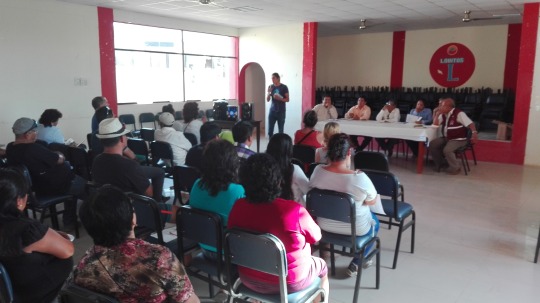
¡Un problema es sólo una oportunidad disfrazada! Para EcoSwell, la inminente llegada del Fenómeno del Niño a Lobitos fue el punto de partida para unificar a los vecinos, asociaciones civiles, instituciones públicas y empresas.
Las Respuestas las Trae el Viento (“The Answers are Blowing in the Wind”)
Un buen amigo mío utilizó este principio en un proyecto fantástico en Mustang Alta – una región remota en las alturas de Nepal, país del Himalaya. La región sufre por los fuertes vientos presentes durante todo el año, que impiden incluso el crecimiento de cualquier cosecha. Usando el diseño Hugh Piggott, instaló una turbina eólica en un pequeño pueblo. El pueblo carecía de electricidad y demás infraestructura básica, pero gracias a la turbina eólica (¡que además se construyó con algunos materiales reusados!) permitió la instalación de algunos focos de luz al interior y exterior de las viviendas. Esto ha cambiado las vidas de los habitantes del pueblo significativamente, a la vez que constituye un ejemplo de varios de los principios de la permacultura.
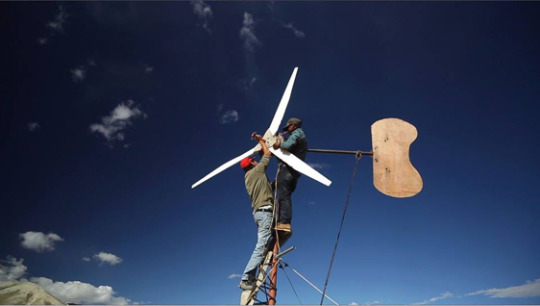
Tashi y Jeevan instalando la turbine eólica en el Namdok, Nepal. (Fotografía guardada desde la página de Facebook “Tashi’s Turbine”)
Este enfoque puede aplicarse a la vida diaria también
Durante el último año de mi pregrado, conseguí un trabajo en una consultora ambiental para la que había trabajado como practicante. Mientras todos mis compañeros buscaban un trabajo, yo estaba relajado, disfrutando de los últimos meses de Universidad, con la confianza del que ya está empleado. Sin embargo, cuando finalmente terminé mis estudios, dada la situación económica por la que estaba pasando el Reino Unido y, en general, toda Europa, la empresa retractó la oferta que me habían hecho. Quedé completamente perturbado.
Durante todo este tiempo, me había sentido orgulloso de haberme organizado lo suficiente como para tener un trabajo asegurado mientras mis compañeros de clase se encontraban preocupados, atendiendo a entrevistas durante todo el verano. Ahora, todos ellos estaban asistiendo a sus primeros días de trabajo, mientras yo escribía carta tras carta a cada una de las empresas relevantes que podía encontrar y recibía respuestas negativas. Tuve algunas entrevistas, pero pasaron las semanas y los meses y aún no encontraba nada. Todo esto constituía un gran problema, mi plan de vida se salía de control. Yo no veía ninguna oportunidad en esto, ninguna manera de beneficiarme de la situación: Mi trabajo soñado se me había arrancado de las manos antes que pudiera empezar y estaba viviendo en casa de mis padres, sin pronta salida.
Al final terminé aceptando un trabajo en una academia deportiva, enseñándole a niños a escalar. En ese momento, lo tomé como un trabajo de corto plazo para pasar el rato y ganar un poco de dinero durante el periodo de búsqueda laboral. A pesar que en ese momento no me di cuenta, ese fue el punto de quiebre para mi. Trabajé ahí durante casi dos años y me encantó. Además, en este periodo adquirí las calificaciones necesarias para ser instructor de escalada, lo que más adelante me permitió encontrar trabajos muy satisfactorios alrededor del mundo. Dejé la academia para hacer una maestría en Ciencias Forestales, lo que me permitió vivir y trabajar en diversos lugares interesantes y hermosos, con objetivos que me hacen sentir más realizado que los que habría tenido trabajando en una consultora.
Después de todo, no obtener el trabajo en la consultora ambiental probablemente fue una gran bendición que abrió muchas puertas para mi. Definitivamente, fue un cambio de planes enorme respecto de lo que había anticipado, pero las cosas, por lo general, cambian y, a pesar que puede ser difícil o hasta doloroso en el momento, estos cambios pueden implicar recompensas masivas en el largo plazo.

Puede ser fácil empantanarse en pensamientos negativos cuando las cosas no salen según lo habíamos planeado. Pero tratar de mantenerse positivo nos puede ayudar a ver oportunidades en cada nueva situación. Enfócate en las oportunidades y los problemas dejarán de serlo. (Imágen de surfsplendorpodcast.com)
Cuando ocurre un “problema”, por lo general se trata de una serie de eventos o un evento particular que no esperábamos, no planeamos o no deseamos. Nos puede agarrar desprevenidos, por lo que tememos y nos empecinamos en redirigir la situación problemática, hacia la que esperábamos o deseábamos. Sin embargo, si la aceptamos tal y como es, entonces nos damos la oportunidad de acercarnos hacia ella desde un ángulo distinto. Desde un nuevo punto de vista, la situación inesperada puede conllevar nuevas oportunidades positivas que no habías pensado. Incluso podría tratarse de una bendición disfrazada, que reporta mejores resultado que si las cosas hubieran marchado con normalidad, aún si estos resultados son beneficiosos de una manera completamente diferente. Tal vez no podemos cambiar la situación, pero sí nuestra reacción hacia ella.
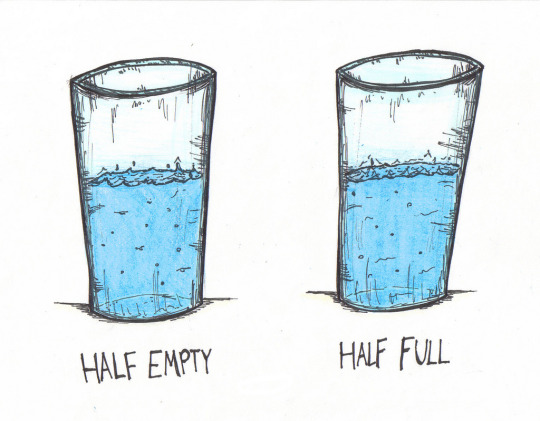
¡Mantenerse positivos ante el cambio constituye una diferencia enorme para detectar los aspectos positivos de la nueva situación! (Imágen de www.staticflickr.com)
Actúa de manera decidida
Esto no significa que debamos conformarnos con el status quo y seguir la corriente de la vida sin importar que nos pase. Esto sería una manera bastante triste de vivir y no tiene cabida en la filosofía de la permacultura. El punto está en no desesperar si las cosas no funcionan como las planeaste. No enfocarse tanto en el resultado que quisimos pero no obtuvimos, sino en aquellos otros resultados que pueden ser igual o más beneficiosos que los planeados. Simplemente tenemos que cambiar nuestra manera en que observamos la nueva situación, para así detectar sus aspectos positivos, adaptar nuestro curso de acción y afrontarla.
________________________________________________________________
Sobre el autor:
Dave Smith: Es un Bachiller en Ciencias Ambientales y Máster en Ciencias Forestales del Reino Unido. Luego de completar un curso de Diseño para la Permacultura en Designed Visions, inició un viaje alrededor del mundo para aprender las maneras como la permacultura esta siendo utilizada en diferentes ámbitos sociales, culturales y ambientales. Mientras vivió en Lobitos, en el norte del Perú, trabajó con la ONG, EcoSwell, iniciando un proyecto de reforestación a costo cero con la comunidad pesquera, en el que se trabaja directamente con la comunidad a nivel de vivienda.
Actualmente Dave está trabajando en Nepal, donde ha creado una pequeña empresa que se specializa en la fabricación de productos artesanales y que opera según los principios de la permacultura.http://khalikhutta.com/
Escrito por: Dave Smith / EcoSwell
0 notes
Text
Permaculture in the real world
Dave ‘PermaDave’ Smith, 2015
PermArticles (1/3)
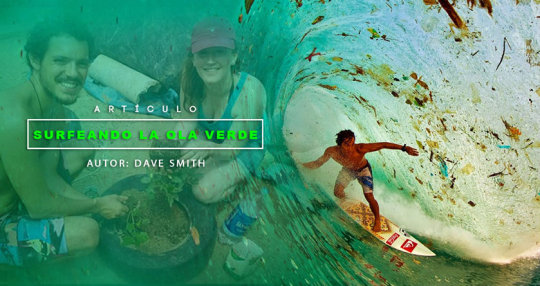
We are increasingly often hearing the word "permaculture" which seems synonymous with organic farming, sustainability and hippies living communally on farms in remote locations living off the land in some unobtainable, fantasy utopia. But what the hell is permaculture? How can someone living a "normal" life in a house or flat, working a "normal" job get involved or utilise permaculture in their life and why should you?!
In this short series of articles I'd like to give you a taste of what permaculture is and how some of its principles can be easily used to reduce our negative impacts on the environment but also improve our own quality of life and that of those around us.
In this first article I'm going to talk about one of my favorite permaculture principles and an important, yet pretty simple one to implement. That is:
Nothing is Waste - thinking in terms of cycles
IF we look at the world as a series of systems working in cycles, all linked together, we can see that there is never any waste produced in nature.
The water cycle, nutrient cycles, life/death etc., all highlight the point that there is no waste in nature - dead plant/animal material ("waste") is a valuable nutrient source for new life and is (re)cycled. Death is an important part of life to allow the birth of new generations without accumulating masses of a species. Imagine if no one and nothing had ever died! THAT would be a population crisis!
Other cycles include the cycle of days and nights, high and low tides. Some cycles take incredibly small periods of time to run, some take longer. Some take so long to run through their whole cycle that we do not notice that they are cycles at all and others are so clear to us we do not always recognise them.
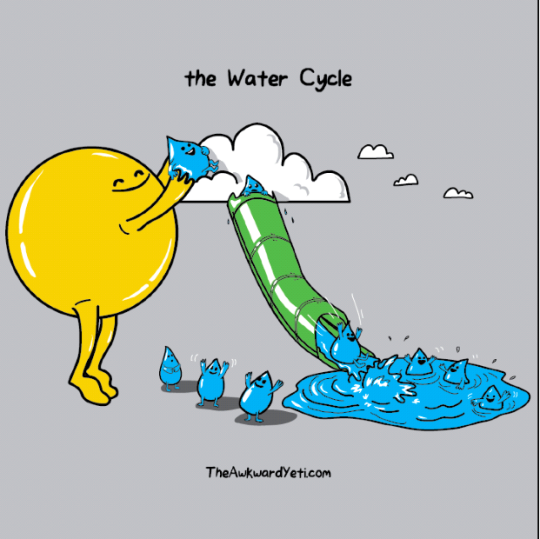
The water cycle is powered directly by the sun, evaporating water from the earth, into the sky and raining it down again, flowing through our rivers into the sea, and back up again.
Wasteful Linear Systems
In modern living, we tend to create and work in linear systems which create waste. Valued resources are taken, used and disposed of.
This system, based on consumption and waste production, however you look at it, whichever side of the argument you are on, is not sustainable. Moving resources from one place to another through a linear system results in nothing being in the "valued" field, and all in the "waste" field.
Imagine always spending your money and never earning any more. Linear movement of your money out of your account will soon show you the results of none cyclic systems. You cannot sustain a positive balance by eating away at your money and not adding back to it.
Nature tries to Step in
With some materials, nature tries to take care of this wasteful, disrespectful practice. Here in Lobitos, "disposal" of human waste creates an oasis for plants to grow as nutrient rich water reaches the surface of the ground.
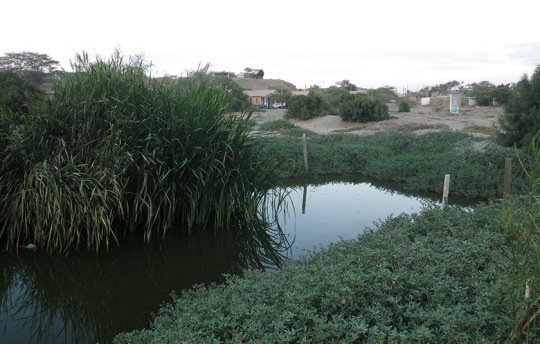
A green oasis in Lobitos believed to be caused by foul water reaching the surface due to a lack of proper waste water treatment facilities/infrastructure.
Other materials are less reusable. The main one being plastic. Another cartoon from TheAwkwardYeti.com illustrates this in a funny way, but the reality is shown more starkly in this picture from Indonesia.
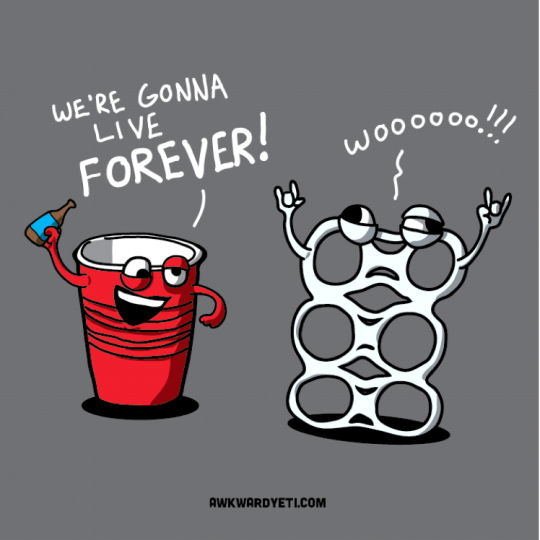
Plastic is believed to never fully degrade in nature. This means that all the plastic you and everyone else who has ever lived have ever thrown away is STILL in existence, somewhere. Just imagine all that plastic: toys, electronic casings, cps, plates, cutlery, polyester clothing etc.
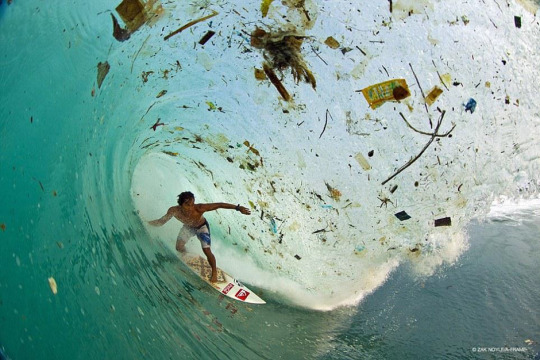
A surfer in Indonesia riding a wave of rubbish. When we put litter in the bin and have it taken away from us, we feel we have done our bit, however, much waste especially plastic, ends up in our oceans. (Photographer: Zak Noyle).
What Can We Do?
One overarching goal in permaculture is closing cycles to prevent the creation waste and therefore loss of resources. This idea may seem complicated, but it can be easily applied to our everyday lives. For example, think what is going into your bin - newspaper? plastic bottles? glass, clothes, food waste? Can you or someone near you use those things? Can you reuse them to reduce the need to acquire more, new materials?

Plastic bottles and drinks cartons can be used (with holes in the bottom) to grow plants - fruits, flowers or vegetables. This is an example of “reuseing” and saves them from becoming waste.
This can reduce the amount of waste you produce, but does not eliminate it. For me, this is why I do not buy more plastic bottles than I "need" and even those, I buy as few as possible. I think about it every time I do. I hope to one day live without plastic at all.
Remember:
1. Reduce - the amount of waste you create by changing your habits and being conscious of the impacts of your decisions and lifestyle. WHATEVER WASTE YOU DO PRODUCE:
2. Reuse - the waste you do create. Like plastic bottle plant pots, using plastic bags more than once when shopping. WHATEVER WASTE YOU CANNOT REUSE:
3. Recycle - take the waste you cannot reuse to a recycling plant where it can be used to make new things.
I believe awareness is the first step and if we start thinking about these things and changing our behaviour a little, we can start to take steps towards a more sustainable future.
“If you think you’re too small to make an impact, try going to sleep with a mosquito in the room”.
-unknown author.
________________________________________________________________
About the authour: Dave Smith is studied Environmental Sciences (BSc) and Forestry (MSc) in the UK. After completing his studies of Design for Permaculture in Design Visions, he travelled around the world in order to learn about the different ways in which permaculture is being used in different social, cultural and environmental contexts. Whilst living in Lobitos, in Northern Peru, he worked with the NGO, EcoSwell, linking closely with the community starting a project of zero-cost reforestation with local fishermen.
Dave is currently based in Nepal where he is setting up a small business specialising in handmade products and operating by permaculture principles http://khalikhutta.com/
Written by: Dave Smith / EcoSwell
Permacultura en el mundo real
Dave ‘PermaDave’ Smith, 2015
PermArticles (1/3)
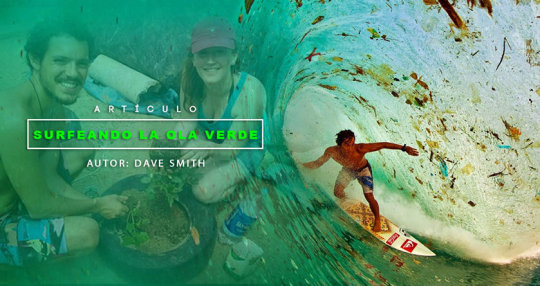
Cada vez escuchamos la palabra “permacultura” con mayor frecuencia. Al parecer se trata de un sinónimo de agricultura orgánica y de hippies que viven de la tierra en comunidad en localidades remotas, en una utopía fantástica e inalcanzable. ¿Pero qué demonios es permacultura realmente? ¿Cómo puede alguien con un puesto de trabajo “normal”, que vive una vida “normal” en una casa o edificio urbano, involucrarse o utilizar la permacultura en su vida diaria? ¿Y por qué debería hacerlo?
En una corta serie de artículos, me gustaría mostrarles qué es la permacultura y cómo algunos de sus principios pueden ser aplicados fácilmente para reducir nuestro impacto negativo en el medio ambiente, pero también para mejorar nuestra propia calidad de vida y la de las personas que nos rodean.
En este primer artículo, hablaré acerca de mi principio favorito en la permacultura. Es uno de los más relevantes y, sin embargo, es de los más fáciles para implementar:
Nada es desechable – pensando en función a ciclos
Si le damos una mirada al mundo natural como una serie de sistemas que trabajan en ciclos, vinculados entre sí, podemos ver que no hay instancia de la naturaleza en la que se produzcan desechos.
En el ciclo del agua, los ciclos de nutrientes, el de la muerte y la vida, etc., se ve resaltado el principio por el cuál no hay nada que sea absolutamente desechable – las plantas y animales muertos son un nutriente valioso y fuente para la nueva vida, por lo que la naturaleza los (re)cicla. La muerte es una parte importante de la vida, pues permite que nazcan nuevas generaciones sin que se acumulen masivamente las especies. ¡Imaginen qué pasaría si nada ni nadie muriera jamás! ¡Nos enfrentaríamos a una VERDADERA crisis poblacional!
Otros ciclos incluyen los días y las noches, las fases de la luna, las mareas altas y las bajas. Algunos de los ciclos toman periodos pequeños para completarse, otros toman mucho más tiempo. Algunos toman tanto tiempo que ni siquiera podemos percibir que se tratan de ciclos y otros son tan evidentes que asombrosamente no siempre podemos reconocerlos.
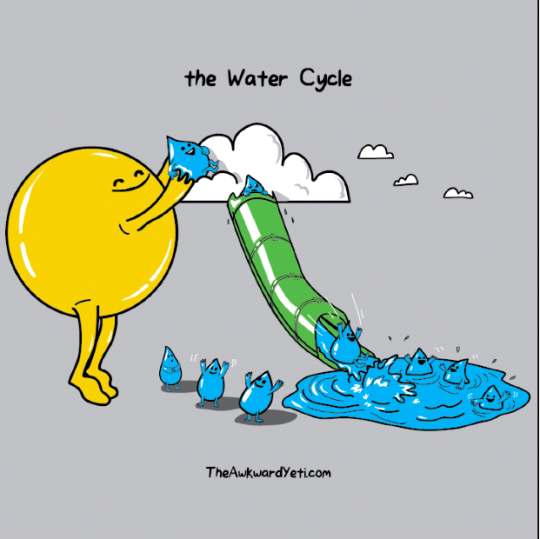
El ciclo del agua es estimulado directamente por el sol, que evapora el agua del mar, dirigiéndola hacia los cielos y luego de vuelta a la tierra en forma de lluvia, que fluye por los ríos de vuelta hacia el mar.
Sistemas lineales repletos de desechos
En la vida moderna, tendemos a crear sistemas lineales que generan desechos. Recogemos recursos valiosos que luego utilizamos y desechamos.
Veámoslo desde cualquier punto de vista que querramos: este sistema basado en el consumo de productos desechables es insostenible. Mover los recursos de un lugar al otro a través de un sistema lineal tiene como resultado que, eventualmente en nuestra percepción, nada se encuentre en el ámbito de lo “valioso” y todo se encuentre en el ámbito de lo “desechable”.
Imagínate que dediques todo tu tiempo a gastar tu dinero y nada en reponerlo. El movimiento lineal del dinero de tu cuenta hacia afuera eventualmente te mostrará los resultados de los sistemas no cíclicos. No es posible sostener un balance positivo si constantemente consumes sin sumar.
La naturaleza trata de intervenir
La naturaleza trata de ocuparse de algunos materiales que resultan de esta irrespetuosa práctica. En Lobitos, algunos de los “desechos” generados por los humanos han generado un oasis de plantas que crecen alrededor de pozos de agua rica en nutrientes que sube a la superficie desde desagües domésticos colapsados.
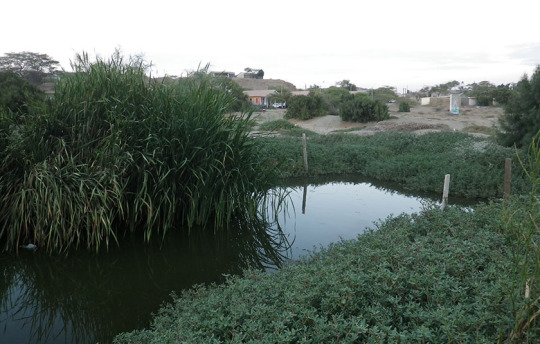
Un oasis de verdor en Lobitos causado por aguas residuales que llegan a la superficie debido a la falta de tratamiento e infraestructura del desagüe.
No obstante, la mayoría de los materiales que desechamos son poco reusables. El principal es el plástico. La caricatura siguiente, extraída de TheAwkwardYeti.com ilustra este problema de manera muy cómica, pero la cruda realidad se evidencia en la siguiente foto de Indonesia.
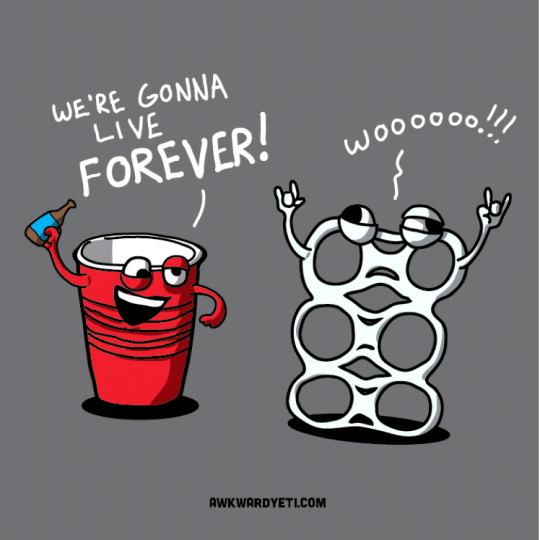
Se cree que el plástico nunca se degrada por completo en la naturaleza. Esto significa que todo el plástico desechado por ti y todas las personas que lo han utilizado desde su creación AÚN existe en algún lugar. Sólo imáginate todo ese plástico: Todos esos juguetes de la infancia, todas las carcasas de tus aparatos electrónicos, todos los vasos, platos y cubiertos de plástico, toda la ropa de polyester que usaste, etc.
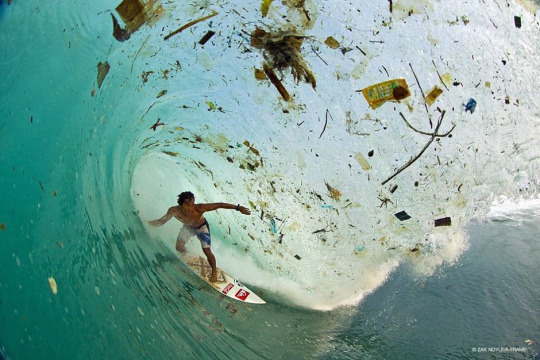
Un surfista en Indonesia corriendo una ola de basura. En el mundo moderno tenemos un servicio que se lleva los desechos que tiramos en el basurero. Esto nos hace sentir que hemos puesto nuestro granito de arena, pero la mayoría de estos desechos, y en particular el plástico, termina en los océanos. (Fotografía: Zak Noyle)
¿Qué podemos hacer?
Una de las principales metas de la permacultura es cerrar los ciclos para evitar la creación de desechos y la pérdida de recursos. Esta idea puede sonar complicada, pero en realidad es fácilmente aplicable en nuestra vida diaria.
Por ejemplo, piensa qué cosas hay en tu basurero – ¿papel periódico, botellas de plástico, vidrio, ropa, comida, desechos? ¿Puedes tú o alguien cercano reutilizar estas cosas? ¿Puedes reutilizarlas para evitar adquirir más de estos materiales en el futuro?

Las botellas de plástico y los cartones pueden ser utilizados (haciendo un hueco en la base) para crecer plantas – frutas, flores y vegetales. Esto es un ejemplo de “reuso” y previene que estos envases se conviertan en desechos.
Esto puede reducir la cantidad de basura que producimos, pero no la elimina. Para mí, esta es la razón por la que no compro más botellas plásticas que las que realmente “necesito”. Cada vez que requiero comprar un producto envasado en plástico, pienso cuidadosamente si no existe una alternativa. Espero algún día ser capaz de vivir sin plástico en lo absoluto.
Recuerden:
1. Reduce – la cantidad de desechos que generas, cambiando tus hábitos y siendo consciente de los impactos de tu estilo de vida y tus decisiones cotidianas.
SI ES QUE PRODUCES DESECHOS:
2. Reusa – los desechos que llegas a generar. Utiliza el plástico como macetas y las bolsas plásticas para varias salidas de compras.
Y CON LOS DESECHOS QUE NO PUEDES REUSAR:
3. Recicla – lleva los desechos que no puedes reusar a los recicladores más cercanos, pues terminará siendo utilizado para generar nuevas cosas. Si no, ya sabes que lo más probable es que termine en el mar…
Creo que la consciencia es el primer paso, y si empezamos a preocuparnos y cambiamos nuestro comportamiento tan sólo un poco, podemos empezar a dar los primeros pasos hacia un futuro más sostenible.
“Si crees que eres demasiado pequeño para causar un impacto, trata de dormir con un mosquito en tu cuarto.” – Anónimo
_______________________________________________________________________
Sobre el autor:
Dave Smith: Es un Bachiller en Ciencias Ambientales y Máster en Ciencias Forestales del Reino Unido. Luego de completar un curso de Diseño para la Permacultura en Designed Visions, inició un viaje alrededor del mundo para aprender las maneras como la permacultura esta siendo utilizada en diferentes ámbitos sociales, culturales y ambientales. Mientras vivió en Lobitos, en el norte del Perú, trabajó con la ONG, EcoSwell, iniciando un proyecto de reforestación a costo cero con la comunidad pesquera, en el que se trabaja directamente con la comunidad a nivel de vivienda.
Actualmente Dave está trabajando en Nepal, donde ha creado una pequeña empresa que se specializa en la fabricación de productos artesanales y que opera según los principios de la permacultura.http://khalikhutta.com/
Escrito por: Dave Smith / EcoSwell
0 notes
Text
The EcoFamily continues to grow!
In 2015 we added 5 new wonderful people to the EcoSwell team.
Our team has been growing very quickly over the past 12 months with dedicated and passionate young professionals with a genuine interest for the sustainable development of vulnerable communities. In 2015 alone we have welcomed 5 new amazing people to the team: Sakthy, Brittany and Liam have joined our team in the UK and Andres and Francisco have joined the team in Peru.
Here is a quick look at their bios:
TEAM UK

Sakthy Selvakumaran
UK operations and fundraising
Cambridge University - Civil Engineering
Sakthy is a Civil-Structural Engineer working on innovative products and solutions in UK construction. Named one of the “Top 30 Under the Age of 30” engineers by the UK Government and Forbes, Sakthy has worked internationally in various fields of sustainability and with various NGO’s. At EcoSwell Sakthy fundraises for us in the UK and is involved in the development of our organization.

Brittany Harris
Project Coordinator and fundraising
The University of Bristol - Civil Engineering
With a masters in Civil Engineering, Brittany first Volunteered with EcoSwell though Engineers Without Borders UK, completing a three month placement assessing the feasibility of alternative sanitation options in Lobitos. Now working in the UK in water and environment consulting she continues to volunteer with our UK team recruiting volunteers and offering technical support on our projects.

Liam Innis
Marketing Coordinator and fundraising
The University of Newcastle - Modern Languages (FR/ES/DE/NL)
Liam studied Modern Languages and is now a Languages Ambassador at “Routes into Languages UK”. He joined EcoSwell in December 2015 and will be leading the social media and publicity of the organization. He has experience in many countries in the education and journalism sectors. He plans on returning to Latin America in 2017 and will be joining our team in Lobitos.
TEAM PERU
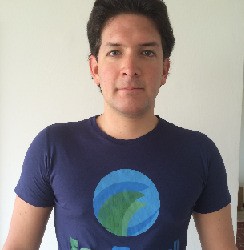
Andres Vernal
Audiovisual Production and Management
University of Lima - Communications
Andres, specializes in Film and TV Production. He has worked more than 5 years as a teacher at the University of Lima and has done numerous audiovisual productions. At EcoSwell, he directs and produces all the videos to funding competitions, to promote projects and to give a major exposition to the organization through social media and interactive platforms.
¡La EcoFamilia sigue creciendo!
En los últimos 12 meses nuestro equipo ha venido creciendo con profesionales dedicados y apasionados, y con un genuino interés por el desarrollo sostenible de comunidades vulnerables. En el 2015 le dimos la bienvenida al equipo a 5 excelentes personas: Sakthy, Brittany y Liam se unieron a nuestro equipo del Reino Unido, mientras que Andrés y Francisco se unieron a nuestro equipo en Perú.
Aquí les dejamos con sus pequeñas biografias:
EQUIPO REINO UNIDO
Sakthy Selvakumaran
Operaciones UK y fundraising
Universidad de Cambridge - Ingenería Civil
Sakthy actualmente está terminando su PhD en Cambridge University. Es ingeniera civil con experiencia en proyectos de innovación en el sector de construcción del Reino Unido. Nombrada una de las “Top 30 antes de los 30” ingenieras por el gobierno Británico, Sakthy ha trabajado en proyectos internacionales en el sector de sostenibilidad y con varias ONG’s. En EcoSwell nos ayuda como fundraiser y está involucrada en el desarrollo de nuestra organización en UK.
Brittany Harris
Coordinador de proyectos y voluntariado
The University of Bristol - Ingenería Civil
Terminando su maestría en Ingenería Civil, Brittany hizo un voluntariado con EcoSwell a través de Ingenieros Sin Fronteras UK (EWB-UK). Durante sus tres meses en Lobitos Brittany logró estudiar la viabilidad de saneamiento alternativo en la forma de ‘Baños Secos’ en la localidad. Actualmente trabaja en el Reino Unido en una consultora de agua y medio ambiente y continúa voluntariando para EcoSwell a través de reclutamiento de voluntarios y apoyo técnico en proyectos.
Liam Innis
Coordinador de marketing y fundraising
The University of Newcastle - Lenguas Modernas (FR/ES/DE/NL)
Liam estudio Lenguas Modernas y ahora trabaja como Embajador de Lenguas en “Routes into Languages UK”. Forma parte del equipo EcoSwell desde diciembre 2015 y estará encargado de la publicidad y manejo de redes sociales. Tiene experiencia en los sectores de educación y periodismo en varios paises del mundo y para el 2017 planea regresar a Latinoamérica para unirse a nuestro equipo en Lobitos.
EQUIPO PERU
Andrés Vernal
Gestión y Realización Audiovisual
ULima - Licenciado en Comunicaciones
Andrés, cuenta con una especialización en Realización Audiovisual por la ULima y ha trabajado más de 5 años como docente en esa misma casa de estudios, habiendo hecho una gran cantidad de productos audiovisuales. Su labor en EcoSwell es realizar los productos audiovisuales para competir en fondos concursables, para promocionar los proyectos y para darle exposición a la organización a través de redes sociales y plataformas interactivas.
0 notes
